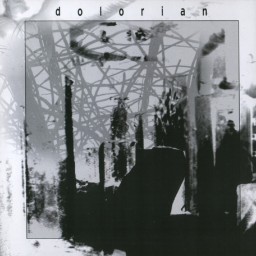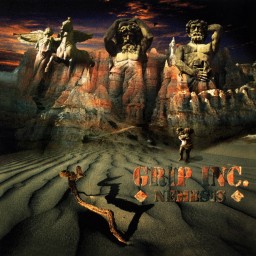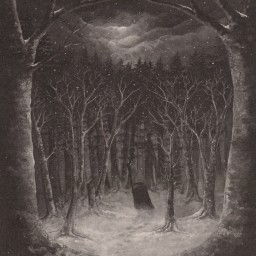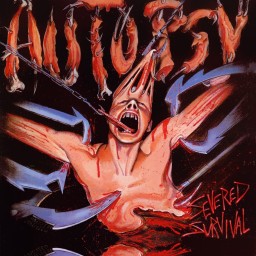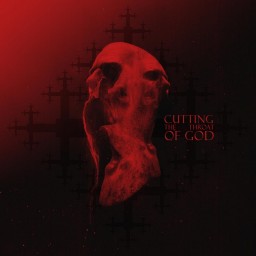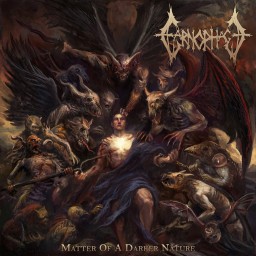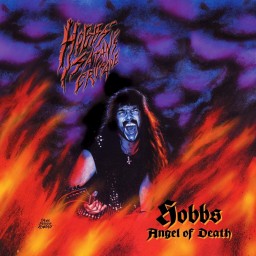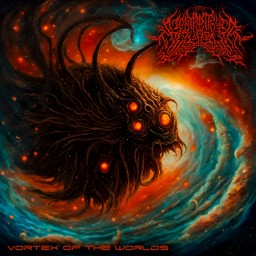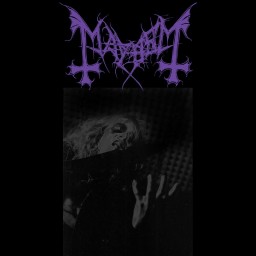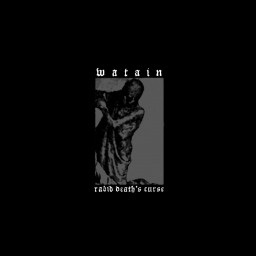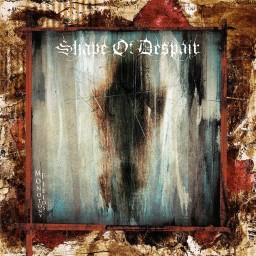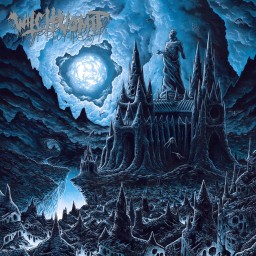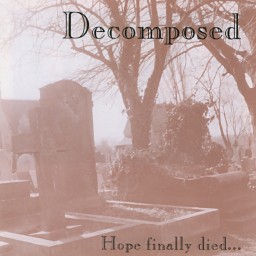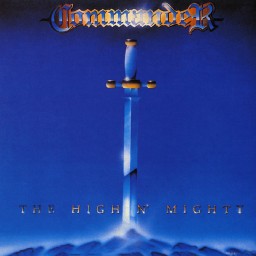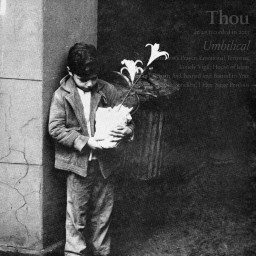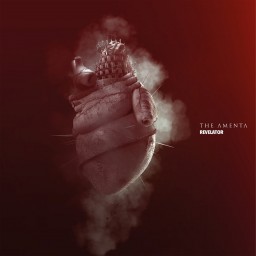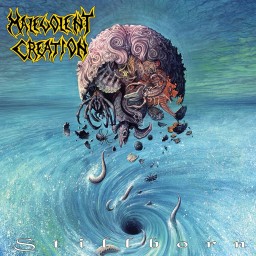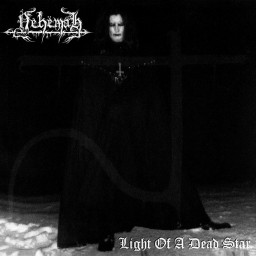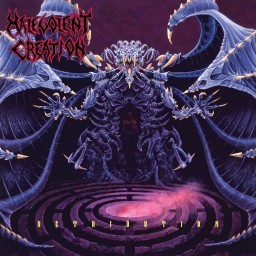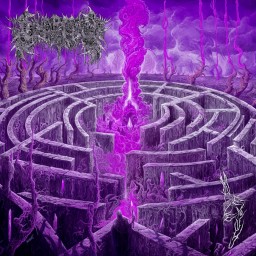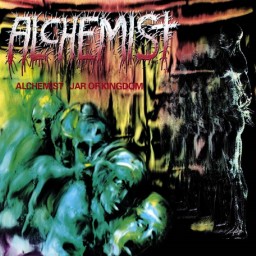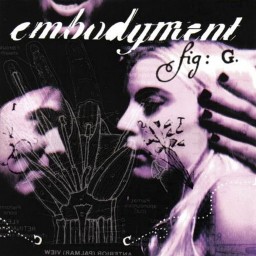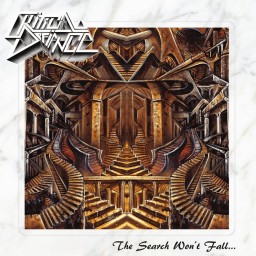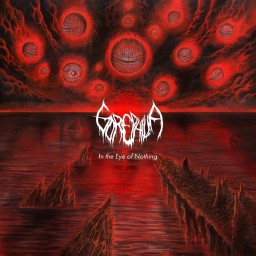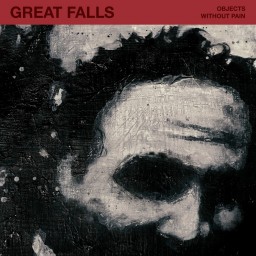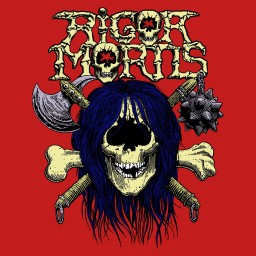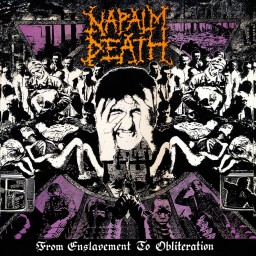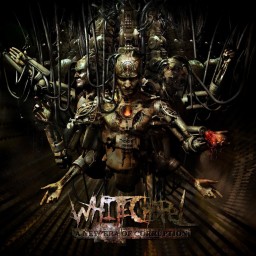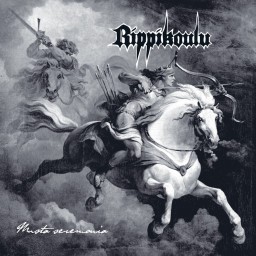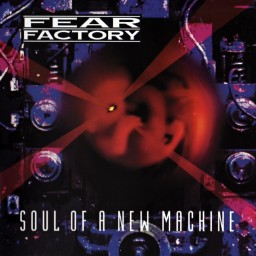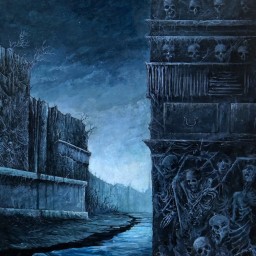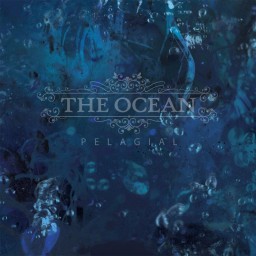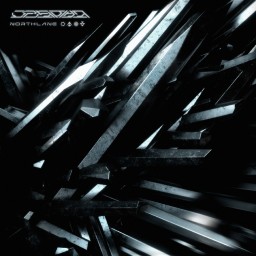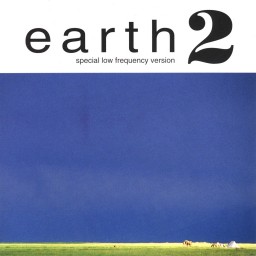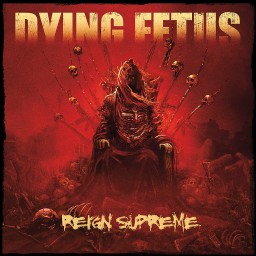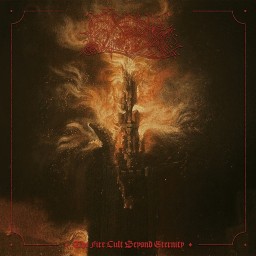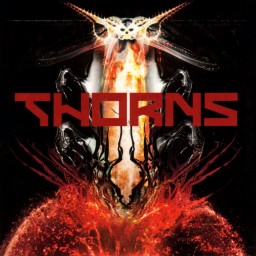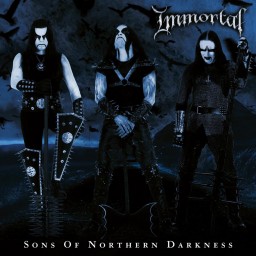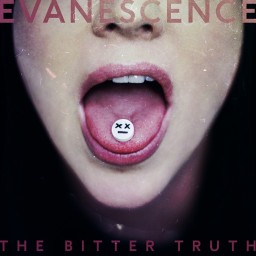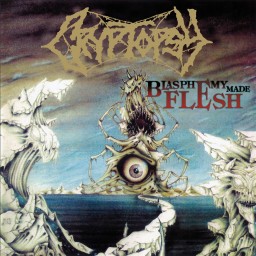Daniel's Reviews
I must admit that, despite having a knowledge of the existence of Finnish doom metal trio Dolorian for many years now, I’d never gotten around to checking them out until my brother Ben nominated them for The Fallen clan feature release status a couple of weeks ago. From what I’d observed, the band were always referred to as a quality artist with their most recent outing (2006’s third album “Voidwards”) having been touted by many as a genuine classic so I came into this experience with considerable optimism, particularly given their high praise from my brother whose taste in metal I generally trust (with the obvious exception of Summoning who suck hard). I’d soon find though that Dolorian offered a lot more than I’d bargained for because their self-titled 2001 album is unlike anything I’ve ever heard before & that’s despite displaying a few obvious influences on their sleeves for the duration.
Firstly, I’d like to say straight up front that I feel that the tagging of “Dolorian” as a doom metal release is deceptive. Yes, Dolorian utilize slow, doomy riffs as a key ingredient in their sound however I’m not sure that it’s the protagonist here. There are many disparate influences being thrown around but to my ears this is predominantly a gothic metal release because the key ingredient that makes Dolorian so special is the consistently outstanding use of clean gothic rock & post-punk inspired melodic guitar work. These lines perpetuate not only the heavier doom sections but they also work to highlight the lengthy atmospheric excursions the band like to take with many of these seeing them hinting at psychedelia & even the post-metal of a band like Isis. The vocal delivery is very unusual for a metal band too with front man Anti Ittna Haapapuro opting for a whispered approach that sees him sitting predominantly in the background while the instrumentation takes the spotlight. In fact, Anti’s vocal contribution sees him taking on more of a supporting role while his ethereal guitar melodies maintain the listeners attention & this is one of the most significant talking points of the album. It really works if you ask me & it gives Dolorian a truly unique atmosphere. As does the repeated use of tribal drumming; a tool that I’ve historically found myself to have a very strong affiliation with as it tends to provoke a ritualistic & more primal feel.
The album kicks off with a beautifully dark three minute introductory piece called “Grey Rain” which I was delighted to find sounds exactly like Italian gothic darkwave exponents MonumentuM. I’m a HHUUGGEE fan of MonumentuM’s 1995 album “In Absentia Christi” & have never heard anything like it since so the hints at their sound that are scattered across “Dolorian” have nothing short of delighted me. “Grey Rain” is followed up by the first proper metal track “Blue Unknown” & it immediately tweaked my interest as it reminds me very much of “Wildhoney” era Tiamat. This is interesting because I’d find myself returning to that reference a number of times throughout the record but I’ve never seen Dolorian being linked with Tiamat before. Perhaps this link is why I have such a strong tendency to want to label the album as a gothic metal release but, to be fair though, the beautifully sombre clean guitar lines that dominate these pieces could have been pulled straight from an old record from The Cure or Joy Division & there simply aren’t enough tracks that offer that true doom metal atmosphere. The vibe we get here is surely dark & the tempos are inevitably slow but the everything feels much more gothic than it does doomy so I can’t even see myself being convinced to go with a both ways bet on the gothic doom metal tag here. Also, I’ve seen quite a lot of references to dark ambient being made online. Of the album’s nine tracks, three of them are short & particularly well executed ambient pieces but don’t expect them to fall into the dark ambient category. There’s nothing that sneaks outside of the more conventional ambient space here for mine but all of these tracks work beautifully within the context of the music around them. In fact, the two minutes of bliss that makes up “Ambiguous Ambivalence” may be the highlight of the entire record for me personally.
I find that my many years of DJing have left me with a bit of a knack for picking up the perfect setting to experience a record. With this one I knew straight up that I needed to listen to it through headphones while lying in isolation in a dark room &, as it turns out, it was only then that I managed to truly understand its ethereal majesty which enabled me to be completely swept up in it. The consistency of the tracklisting is nothing short of exceptional. There’s not a single track that doesn’t impress me in one way or another with the last four tracks representing a particularly spectacular run of high-quality art. You’ll notice that I chose the word art there & I did that intentionally because this is one of those records that feels like you’re experiencing genuine art rather than the regurgitating of some similar influences because, despite sporting some familiar elements, the sum of “Dolorian” simply doesn’t sound like anyone else & this makes this record a particularly worthy selection for a feature release. Dolorian” comes highly recommended from this ol’ metalhead as you won’t hear too many records like it. Just be prepared to give it your full & undivided attention & a good few listens to allow its charms to open up.
For fans of MonumentuM, Katatonia & “Wildhoney”-era Tiamat.
Genres: Doom Metal
Format: Album
Year: 2001
Los Angeles groove metal outfit Grip Inc. are an artist that I’ve been acutely aware of since their inception back in 1993 but I’m going to have to admit that I’ve probably been guilty of making assumptions about their sound based on a subgenre box-ticking mentality to be honest. Dave Lombardo-era Slayer is undoubtedly the absolute peak of music (if not our overall human existence on this planet) as far as I’m concerned however I’ve simply refused to have his legacy tainted by his subsequent foray into a subgenre that (with the exception of its godfathers Pantera) I’ve always found to be predominantly underwhelming. That underlying fear has kept me from ever allowing myself to experience a Grip Inc. record in full to this very day & after going through the process of having my misconceptions removed & royally stuffed up my closed-minded & inherently stubborn backside over the last couple of days I’m feeling a little ashamed of myself. I’m also feeling particularly proud of my younger brother Ben who has once again nominated an incredibly underrated release for Metal Academy feature status. Most of you probably don’t know this but Ben is completely deaf in his left ear & knows very little about musical theory or technique but time & time again the dude has proven himself to have a greater level of discretion in that single ear than most packed metal venues do & refuses to let the masses influence his judgement too. The fact that Grip Inc’s 1997 sophomore album “Nemesis” has been such a wonderful surprise to me is simply further testament to that fact.
Unfortunately for Lombardo & co., my initial impressions of “Nemesis” were somewhat clouded by having listened to it directly after our The Guardians feature release in Grand Magus’ “Hammer Of The North” which sports a superbly thick & heavy production & this resulted in the feeling that the “Nemesis” production job was noticeably lacking. It’s certainly true that it feels a lot thinner in comparison with a lot more high end, significantly less bottom end & the drums & guitars not having anywhere near the same sort of weight but once I’d given myself a day to let it sink in & returned to it with fresh ears (this time through quality headphones) I was able to reach a happy place where those comparisons faded away very quickly. The other early talking point for me was about just how little generic groove metal I heard. I mean, I was expecting something similar to Pantera, Machine Head & “Chaos AD” era Sepultura but found myself struggling to make the link very often during my first listen. I heard a lot more thrash than I did groove metal to tell you the truth &, as a result, I made a point of giving that notion a strong focus on subsequent listens.
Given my life-long passion for classic Slayer, I often find myself scoring releases that manage to successfully harness that sound a little higher than your average punter & you can count “Nemesis” amongst those that do it exceptionally well so Slayer fans will be feeling quite emotional (if not violently so) from the word go with this record. Opening number “Pathetic Liar” is a sensational example of a band that’s taken that Slayer blueprint & used it to create a piece that may sound familiar but also rips you a new arsehole in no uncertain terms. The influence of Lombardo has no doubt played a big role in this however there’s a lot more to Grip Inc. than that as both Kerry King & Jeff Hannemann would have been over the moon if they had created some of these riffs. Vocalist Gus Chambers sports a wonderful voice for aggressive metal music too. It’s gruff enough to punish you during the more aggressive parts & his screams are used beautifully in highlighting the climaxes however he’s also got more than enough substance to handle the more atmospheric sections of the album so I actually think he’s a big part of the appeal of Grip Inc.
After pummelling you with those first couple of thrash-fests, we see the album settling down a little & taking you to more expansive & ambitious places than your average thrash or groove metal outfit are capable of. In fact, by the end of the record you’ll be left wondering how you’ve managed to take such an interesting journey without the slightest sign of any jarring transitions or sudden u-turns. I actually think this may be the best attribute of “Nemesis” to tell you the truth. It’s simply so much more than what it’s touted to be & I’m tempted to say that it hasn’t been done any favours by its having been pigeon-holed with the likes of Soulfly & Machine Head. There’s an amazingly well-defined use of texture & atmosphere here that is much more in line with post-metal than anything else with Lombardo consistently utilizing tribal drumming techniques to build tension & create drama. At first I thought he may be borrowing the technique from Sepultura who had been so successful in integrating their local heritage into their sound on a record like “Chaos AD” however the result is much more in line with the likes of Neurosis which is a big compliment if you know how much I adore that band. Guitarist Waldemar Sorychta often opts for dissonant open-string guitar work that would feel a lot more at home on an industrial metal record than a groove metal one &, when combined with the intelligent use of repetition, we see the tension building until an immense Devin Townsend-esque scream from Chambers will lead the band into a huge climax or a drum roll from Lomabardo will see the band ripping back into a chunky groove metal riff or a rip-snorting thrash beat. Wow! This is a group of musicians who well & truly know what they’re doing & are not to be over-awed by the presence of thrash royalty.
The tracklisting on “Nemesis” is extremely consistent as there’s not a weak moment across the entire duration but there are also more than enough highlights to see me reaching for the higher scores. Whether it’s the afore-mentioned opener “Pathetic Liar”, the tension-building tribal interlude “Descending Darkness”, the up-tempo thrash-fest “War Between One”, the “Seasons In The Abyss” feel of personal favourite “Rusty Nail” or the maturity & class of “Myth Or Man”, “Nemesis” offers tier one quality in everything it touches. It’s also worth mentioning that, when taken in holistically, it doesn’t really sound like anyone in particular & is subsequently fairly hard to categorize. I mean, I don’t think I’ve heard a thrash/groove metal act taking this more atmospheric approach before &, after sitting through this wonderful album, I have to wonder why not because it adds an additional element that increased my emotional & intellectual engagement. As a result, I also find myself wondering why I haven’t heard more about “Nemesis” over the years. There can be no denying that it’s horribly underrated & I can only speculate that the cheap cover art might have something to do with it as it really is a long way from acceptable. Please make sure that you don’t let that flaw taint your musical experience because Grip Inc. have the ability to satisfy a lot more than just your violent urges.
For fans of Slayer, Exhorder & Sepultura.
Genres: Groove Metal Thrash Metal
Format: Album
Year: 1997
The Swiss black metal scene has always been more about quality over quantity. I mean despite providing the world with one of its earliest & most revered blackened thrash metal icons in short-lived Zurich trio Hellhammer in the early 1980’s, the Swiss failed to develop any other significant contributors for the remainder of the decade. The early 1990’s would see the arrival of Samael as a considerable underground force, just in time for the Norwegians to take the metal world by storm & make the genre into a household name with metal fans across the globe. But by the time the mid-90’s had arrived Samael had jumped ship & headed away from their black metal roots to take up an admittedly classy industrial metal direction & in doing so left a gaping hole in the Swiss black metal world with no suitable replacements in sight. I have to admit that I’ve always questioned Samael’s timing given that they’d just released their finest black metal album in 1994’s “Ceremony Of Opposites” & the buzz around black metal was at an all-time high off the back of our old mates Varg & Euronymous. Perhaps they didn’t get the memo or found it to be illegible due to excessive blood-soaking. Interestingly though, unlike the rest of Scandinavia, Switzerland had no real intention of cashing in on extreme metal’s newest fad. They were patiently waiting for a hero. A hero that would lead them through the next twenty-odd years of black metal history.
The Second Wave of Black Metal didn’t take long to branch out artistically. Just eighteen months after Darkthrone took the world by storm with their “A Blaze In The Northern Sky” album, Varg Vikernes & his Burzum project would begin hinting at a more atmospheric form of black metal based on trance-like repetition & textured lo-fi production. The next few years would see him not only developing but also completely mastering the sound which would peak with his 1996 post-incarceration masterpiece “Filosofem”. Other Europeans quickly took note with artists like Ulver, In The Woods…, Blut aus Nord & Summoning all releasing significant recordings between 1994 & 1997.
This didn’t go unnoticed by 19 year-old Swiss multi-instrumentalist Tobias Mockl who would develop a major fascination with Burzum’s music & would subsequently put together a solo project with the sole intension of replicating his idol. He called this project Paysage d’Hiver (which is French for “winter landscape”) & 1998 would see Tobias (or “Wintherr” as he would call himself moving forwards) releasing the first in a long series of demo tapes based around the theme of winter. The series would continue for 15 years with Wintherr apparently determined not to have his image & vision tainted by commercialism. For this reason, he was very strict about keeping each release officially labelled as a demo rather than a proper album release. Each demo would also see him telling different parts of the one epic story & not always in chronological order.
Wintherr would quickly become the leader that Swiss black metal been waiting for & his influence would see the local scene producing a number of noteworthy exponents of this more atmospheric black metal sound over the next two decades. The most celebrated of which would be his collaborative project Darkspace & the solo work of his Darkspace band mate Zhaaral which went by the name of Sun Of The Blind but artists like Vinterriket, Tardigrada, Rorcal, Can Bardd & Nordlicht are also worth mentioning. I wasn’t fortunate enough to come into contact with Paysage d’Hiver until 2009 when I investigated his self-titled 1999 release after being recommended it by Ben & seeing it receiving genuine classic status on a number of online resources. I was suitably impressed but perhaps wasn’t drawn into the fanatical sort of response I saw it commanding of others. My subsequent experiences with Paysage d’Hiver have certainly wet my appetite for what is supposedly the project’s first legitimate album release though & a 120 minutes marathon it is too. It’s been a full seven years since the last Paysage d’Hiver record so perhaps he’s making up for lost time. Let’s see what “Im Wald” is all about, shall we?
“Im Wald” is to be released through Wintherr’s own label Kunsthall Produktionen which he runs with Nimosh of the band Nordlicht. This is no real surprise as all of the Paysage d’Hiver releases have been through Kunsthall thus far. Apparently the version of that I’ve been listening to is a rip of one of the copies supplied on USB sticks to those lucky enough to have been in attendance at the pre-release listening party on 25th January 2020. The proper release date is slated for 26th June 2020 which means that we’re well ahead of the game here. “Im Wald” is German for “In The Forest” which is a pretty generic title for a black metal release it has to be said however Paysage d’Hiver have a stronger claim to it than most. The attractive cover art is certainly reflective of the title & it delivers a suitable amount of dark & foreboding atmosphere to the table straight up.
There’s not been any reference to a third-party producer being responsible for overseeing the production of “Im Wald” that I’m aware of so one would assume that it’s another self-produced effort. Given the attention to detail that Wintherr has shown with his art over the years, it probably wasn’t ever an option to involve anyone else in the recording process. Particularly given that the drums & synths are programmed rather than being performed live in a studio & also the lo-fi recording qualities that Paysage d’Hiver has built their reputation on. And that lo-fi element is certainly still here on “Im Wald” however there’s a clarity to this material that wasn’t there on previous releases. The riffs & instrumentation are more decipherable than we’re used to from Wintherr. He’s always used the intentional blurring of the instrumental tracks as a tool for creating a cold atmosphere & he’s certainly still approached his craft in the same way here only he’s allowed just enough definition to give these tracks some additional melodic context which was a master stroke in my opinion. You can still expect the noisy guitar tracks to come at you in sweeping waves with the vocals held back in the mix so that they sound almost like a tortured animal crying out in agony in the background though. Also, much like on the self-titled release, you can expect to hear some of those strange alternate instruments layered over the top of the traditional black metal that don’t seem to fit in with the rest of the track. This is by no means a deal breaker but I just don’t feel that he’s ever quite worked out how to fully integrate those elements & they often sound misplaced to my ears.
“Im Wald” takes the form of thirteen tracks totaling a full two hours. Four or five of those tracks are made up of shorter interludes that are invariably drenched in field recordings of bitterly cold ice winds blowing through the trees of the darkest forests but are each unique in their musical direction. A couple of them ooze of “Filosofem”-period Burzum whilst “Eulengesang” is pure Aphex Twin & “Verweilen” reminds me heavily of “Satellite Serenade” by Japanese electronic producer Keiichi Suzuki. I’ve gotta say, the dude has taste! Those are some high quality & impressively diverse influences & every one of these interludes is unique & of a very high standard. In fact, they really help to break up what is essentially a very long album for extreme metal & I’d actually suggest that the interludes & atmospheric tracks may be the highlights of the first hour rather than the genuine black metal numbers. The black metal tracks also offer a fair bit of variety with each piece possessing its own unique personality. So much so that “Im Wald” can sound a little more like a compilation of different material than a cohesive album during the first half of the album. Thankfully things come together much more tightly through the back end though.
The tempo is quite hectic for an atmospheric black metal release & certainly seems faster than I can remember from my previous experiences with Paysage d’Hiver. In fact, when you take into account the clearer production & the more intense style it does see me reaching for your more traditional black metal tag quite regularly. This is a noticeably more metal-oriented release than we’ve heard from Paysage d’Hiver’s more recent works & it’s chock full of your classic Norwegian tremolo riffs delivered in a similarly repetitive vein to 90’s Darkthrone . These can often be trance-inducing only the drum programming has been beautifully composed to highlight the changes & keep the tracks building. The guitars come in the form of a truly ominous & ever swarming mass that’s full of darkness & forboding. It’s interesting that the guitar performances aren’t perfectly in time with the programmed drumming on some tracks (particularly during the first hour) however this somehow seems appropriate with a raw & lo-fi black metal release like this one. In direct contrast to the up-front guitars is the use of synthesizers which are employed very subtly & are a major ingredient in the impressive tension & huge climaxes that Wintherr has orchestrated, particularly during the back half of the album where the synths seem to creep up on you very slowly until they're lifting the tracks to greater heights than you realized possible earlier on in the piece.
There are no weak tracks included here although the first hour is not nearly as strong as the second which is as close to perfect as you’ll find in extreme metal. Almost every track possesses traces of pure genius but the ones that fail to truly fulfill their potential tend to suffer from some inappropriate melodic or artistic decisions. “Stimmen in wald” is a good example of this with its consistent use of slightly cheesy “Hammerheart”-era Bathory style choirs managing to partially nullify some strong instrumentation while opener “Im Winterwald” sees some excellent groundwork being somewhat tainted by an ill-advised progressive electronic melody midway through the track. “Alt” suffers a similar affliction with what sounds like an apparently unrelated acoustic guitar arpeggio being layered over some blasting black metal. I made similar comments about the “Paysage d’Hiver” album from twenty years earlier so it would seem that Wintherr is a slow learner in this regard. He’s simply much more effective when he concentrates on the main black metal tools.
Whereas a lot of Paysage d’Hiver’s discography relies heavily on mid-90’s Burzum for inspiration, “Im Wald” sees Wintherr drawing on a wider range of classic extreme metal influences with traces of Emperor being found in the huge atmospheres & back-of-the-mix vocal approach while certain tracks sound almost like tributes to “Monotheist” period Celtic Frost (“Weiter, immer weiter”), Primordial’s “To The Nameless Dead” album (“Le Reve Lucide”) & “Transilvanian Hunger”-era Darkthrone (“Kalteschauer”). All of those tracks are spectacularly successful in these undertakings though it has to be said & are at least as effective as their sources of inspiration. Burzum’s underlying menace is still visible throughout, even if it can be slightly offset by some of those imperfect melodic decisions in hour one. There’s a rare majesty to this music when Wintherr gets things just right. He possesses the rare ability to create music that represents the truest embodiment of a snow-filled winter & his years of making this style of music have seen him mastering the art of building tension; the releases of which usually come through incredibly well timed & executed changes in drum beat.
Wintherr’s vocal performance is worth discussing as it’s noticeably more effective than it was on an album like the self-titled. He’s always used his voice more as an additional instrument than as a focal point & intentionally blends it into the instrumentation rather than pushing it out to the front of the mix. His shrieking screams often bring to mind “Under The Sign Of The Black Mark” era Bathory in tone here however their positioning in the mix gives them a slightly different but no less frightening timbre. Nowhere is this better highlighted than in the second hour of “Im Wald” which needs to be discussed in a bit more detail because it’s essentially the best thing I’ve heard come out of the black metal scene in many years, if not decades! Wintherr uses quality riffs & repetition along with subtle rhythmic changes to build the tracks subtly over long periods before gradually bringing in synthesizers & additional guitar tracks for huge & cripplingly dark crescendos that can only be described as black metal mastery. Wintherr has an incredible understanding of what it is that makes the black metal classics so great. That quality seems to have been lost over the years & I’m thrilled to hear that we still have artists that appreciate & understand these key elements & characteristics & don’t feel the need to hide behind disparate genre-crossing or dilution of the black metal model but instead bask in the glory of a more pure approach to black metal. You will simply not find a better example of this than the epic 19 minute closer “So hallt es wider”. It completely releases the shackles & drives home everything that is so great about elite level black metal. In fact, I wouldn’t hesitate to label it as one of the most sinister & genuinely intimidating pieces of music ever written. It almost defies belief that we’re hearing this in 2020. It’s the truest musical embodiment of Scandinavian winter you’re ever likely to find; Varg included. In fact, it may just be the best black metal track ever recorded & the previously mentioned “Kalteschauer” isn’t all that far behind it either to be fair.
“Im Wald” is an absolutely massive undertaking & one gets the feeling that Wintherr has been honing & refining this material over a very long period with the specific intension of making his first proper album a release of extreme magnitude. If that was the case, then he’s achieved his goal in no uncertain terms. This is certainly not a perfect record but I think there’s a case for it being labelled as a classic one given the consistent quality & the sheer quantity of tracks that are at that elite level. To keep the listener completely engaged across an entire two hours of extreme metal is an achievement in itself & I wouldn’t be surprised if Wintherr has intentionally loaded the back end with the best material in order to ensure that his audience don’t lose interest over time. I have to say, despite any negative statements I made earlier, the first hour is of a very solid standard that’s not too far from Paysage d’Hiver’s self-titled release in terms of overall quality but I’m disappointed that he hasn’t trimmed off the fat & released a one hour album here. If that had happened then I may just be claiming it as one of the top few metal releases ever recorded & I don’t say that lightly at all. This is absolutely essential listening for all fans of the black metal genre.
For fans of: Burzum, Darkspace, Darkthrone
Genres: Black Metal
Format: Album
Year: 2020
Most death metal fans know the story. 18 year-old drummer Chris Reifert joins seminal death metal legends Death in San Francisco in 1986 before taking part in the recording of one of the most important records in the creation of the death metal genre in 1987’s “Scream Bloody Gore”. Death band leader Chuck Schuldiner then decides to move back to Florida & gives Chris the option to relocate. Chris elects to stay in San Francisco & forms another one of the classic old-school death metal bands in Autopsy in August 1987. 1988’s “Critical Madness” demo sees the band signing with UK crust punk label Peaceville Records for the recording of their seminal 1989 debut album “Severed Survival” & the world rejoices. It’s somewhat of a fairytale for a number of reasons really. I mean for every band that goes on to critical & commercial success you’ll find a slew of failed musicians that fell by the wayside never to be heard from again & it’s actually quite rare to see this sort of success story (although there are definite parallels to the Dave Mustaine one with Metallica & Megadeth). And for Peaceville, it would be a change of musical direction that would quickly lead to the creation of a viable full-time business & one that is still going strong a full three decades later. But is “Severed Survival” all that it’s cracked up to be? Let’s find out.
The recording of Autopsy’s debut full-length would be a joint effort with Peaceville bringing in Metal Church guitarist John Marshall to co-produce the record at Starlight Sound Studios in California in January 1989. Marshall had previously produced not only Metal Church’s “Blessing In Disguise” record but also Sadus’ 1988 debut full-length “Illusions” so when Autopsy bassist Ken Sorvari made himself unavailable for the recording of the album for personal reasons, the now legendary Sadus bass virtuoso Steve DiGiorgio was drafted in to complete the recordings as a hired gun. I think it’s probably fair to say that Steve had no idea of just how prominent a role he would play in the way that Autopsy’s album would sound at the time.
The “Severed Survival” album would be released on 24th April 1989 & would sport some grisly cover artwork that depicted an image of some poor soul being torn limb from limb by a number of metallic hooks. Autopsy’s moniker would be displayed in what looked like raw meat which would be a further indication of the depraved sounds you were likely to hear within. It’s a fairly cheap looking effort it has to be said & later re-releases would see it replaced with a much more impressive illustration of some zombified surgeons peering down into the eyes of some unfortunate patient. I greatly prefer the look & feel of the re-release as it looks much more glossy & professional which would see it competing quite well in the extreme metal market environment of the time which saw every band & their dog coming up with increasingly attractive images of pure darkness.
The sound that was captured for the “Severed Survival” album was unlike anything the underground metal scene had heard before & it would go on to become a signature sound for Autopsy throughout their career. It was much sludgier & substantially less precise than most 80’s metal with a huge emphasis being placed on creating a genuinely disturbing atmosphere of death & torture that’s not too dissimilar to the image shown on the original release of the album. In fact, "Severed Survival" legitimately sounds like you’re inside the twisted mind of a serial killer in that it exudes an unsettling feeling of impending doom throughout. In order to achieve this, Marshall & the band have opted for a much sloppier & looser feel than most metal bands of the time were going for & in hindsight it was a stroke of genius. The drums were tuned quite loosely to give the toms & kick drum a deep tub-thumpin’ sound while DiGiorgio’s bass guitar would be elevated right to the front of the mix to provide additional emphasis to Autopsy’s already crushing riffs which were presented with a very distinctive & fuzzy rhythm guitar sound. The guitar solos of Eric Cutler & Danny Coralles seer over the top of the rhythm tracks thanks to a heavily filtered tone that was likely achieved with a stationary wah pedal if I’m not mistaken. Truth be told, it’s a really great sound for death metal & I don’t doubt that it was one of the primary reasons that “Severed Survival” would go on to be so successful for Autopsy.
Musically, Autopsy also offered the death metal community something a little different. The basis of their style was built on the “Scream Bloody Gore” model of old-school death metal that Reifert had played such a strong part in creating only Autopsy were a lot less sophisticated than peers like Morbid Angel, Pestilence or Death. There’s a much punkier vibe going on here than anything we’d hear from those bands & I put a lot of that down to Reifert’s drumming. I probably should have mentioned it earlier but Chris is one of the rare metal drummers that also handles the lead vocal duties & I’d suggest that his signature style is the logical outcome of that arrangement as it’s fairly simple. His best work invariably occurs when he goes for a more tribal feel during Autopsy’s doomier moments but I have to admit that his more up-beat & punk-driven beats are a bit of a let-down for me personally. They’re just not my thing particularly. I much prefer Autopsy’s strong use of slow dirge-like doom metal riffs with bands like Black Sabbath & Trouble clearly having made a substantial impression on the band. In fact, it can easily be argued that “Severed Survival” is the true birthplace of the doom/death subgenre as it’s such a major component of what makes Autopsy so appealing. I absolutely love the crushingly heavy & suffocating darkness in these parts & it’s the uneasiness it leaves the listener feeling that makes it so appropriate for a band whose lyrical themes are so heavily centred around serial killers. When you stick in the occasional off-beat arrangement with clever transitions & some very twisted lead harmonies you’re left with one beast of a death metal sound.
The performance of Steve DiGiorgio isn’t one of his most challenging & experimental but he certainly adds an additional layer to Autopsy’s already disturbing sound. His bass work is truly punishing & I particularly enjoy his use of bass chords at key moments which makes for something a little different. I’d highly recommend that you make sure you have a decent set of speakers before giving “Severed Survival” a spin though as you could be in for a rude shock otherwise. Cutler & Coralles show off some decent chops during their solos however I do think that there’s a little bit of a lack of ambition in their faster solos which tend go for a huge flurry of notes without really saying all that much. Their slower lead work is much more interesting as their note-selection can be quite unnerving at times.
Reifert’s vocals were always going to be a talking point because there’s been very little restraint shown in his approach. I wouldn’t say that he goes for your classic death metal grunt. His performance here sounds more like the crazed bellows & barks of an emotionally tortured & psychologically twisted serial killer. It’s almost like he’s too embarrassed for people to decipher the storylines he’s subjecting us to because I’ll be damned if he isn’t intentionally trying to make his language less intelligible. I have to admit that I don’t love his delivery & I’ve often wondered what Autopsy could have achieved with a full-time front man but it’s definitely worth dwelling on Chris’ sick, gore-soaked lyrical content for a minute because “Severed Survival” would be the record that would kick off a generation of subsequent death metal bands working predominantly with a palate of disgusting & offensive filth…. in a good way of course! Some may say that we’re better off for not being able to understand what Reifert’s saying & one look at the lyrics should tell you very quickly which side of the fence you fall on.
Ultimately I’m always left with mixed feelings about “Severed Survival” & it’s been that way since I first encountered it back in 1989/90. I love Autopsy’s swampy sound & the authentic atmosphere of pure death it pervades. They really did create something very original there & their talent for writing the eeriest doom metal riffs imaginable leaves me wishing that they would have taken that direction in more of a full-time capacity just the once so that I could see what it might have amounted to. Unfortunately, I just don’t find their bouncier up-tempo material even half as appealing & almost every track sees some glorious doom material being tarnished by one or two lethargic & unintimidating punk-driven beats. The overall result is that whilst I enjoy almost every track on “Severed Survival”, I very rarely LOVE any of these tracks. It’s only really “Charred Remains” & “Ridden With Disease” that manage to overcome this issue & for this reason I find this release to be the very epitome of a 3.5/5 release by my rating system. I’m not sure I’d say that “Severed Survival” is overrated. The influence it's so clearly had on a band like Carcass is undeniable so I think it's more just a matter of it not quite fitting in with my comfort zone despite being a generally rewarding listen.
For fans of: Asphyx, Abscess, Pungent Stench.
Genres: Death Metal
Format: Album
Year: 1989
New Zealand dissonant death metal masters Ulcerate's last album was a complete game-changer for me. The trio were largely responsible for converting me to the more dissonant brand of modern death metal after I'd originally been introduced to them through their classic 2009 sophomore album "Everything is Fire" but 2020's "Stare Into Death & Be Still" represented somewhat of a culmination of everything they'd done up until that point & it would become a categorical statement of intent to the global metal scene. It didn't do anything drastically different to what we'd heard from the band previously with its adjustments in technique & structure only being quite subtle. They'd somehow managed to make their dissonant sound more warm & melodic without losing any of the avant-garde dissonance & it worked absolutely brilliantly. I can still remember indulging myself in it while walking the streets of their hometown of Auckland while I was still managing the New Zealand service business at my previous employer & "Stare Into Death & Be Still" has since gone on to be awarded a place in my Top 100 Metal Releases of All Time list, such was its impact on me. That kind of recognition places a lot of pressure & expectation on an artist's next release though so it's lucky then that last year's "Cutting the Throat of God" is yet another marvelous achievement for one of the elite performers in all of metal.
"Cutting the Throat of God" saw Ulcerate returning with the same lineup that had recorded all of their albums to date. They're kinda unique in that regard with their consistency of personnel & their insular approach to creation playing a strong role in their ultimate success as they're afforded the time to grow & develop together at their own rate. They've also handled the recording & mixing themselves with drummer extraordinaire Jamie Saint Merat (Verberis) generally being taking the reins as the mastermind behind the creation of each album. The band's seventh full-length was recorded from September to December 2023 & would be Ulcerate's second full-length for French metal label Debemur Morti Productions. It sounds pretty spectacular too with Merat having achieved enough clarity to ensure that the cacophony of instrumentation makes complete sense but leaving enough noise in the equation to highlight Ulcerate's chaotic edge at the same time. His drum sound is a definite highlight of the production for me as it beautifully showcases Merat's unbelievable skill & creativity with his kick drum cutting through the mix with precision & power. I honestly think this dude might be an alien because this sort of shit simply shouldn't be humanly possible as far as I can see. He's an absolute drum enigma at this point & is only getting better & better with age. The vocals of bass player Paul Kelland (The Temple) boom out of the speakers with a similar aggression to what we heard on the last record, sounding absolutely monstrous at times, while the thick layers of guitar interplay from Michael Hoggard possess a unique understanding of counterpoint & melodic/harmonic theory, despite their clear emphasis on tension & dissonance. To be blunt, the album simply sounds like you're listening to the premier exponents of their craft because... well... you are!
"Cutting the Throat of God" contains an expansive array of different textures & atmospheres that take the listener on a journey that can often feel all-consuming but is tied together by common themes which seem to be very tightly constructed. If you're familiar with Ulcerate's previous work then this won't sound foreign to you at all. In fact, this is a very similar record to "Stare Into Death & Be Still" is most respects &, at this point, Ulcerate are starting to feel a little like AC/DC or Cannibal Corpse in that you know exactly what you're going to get but it doesn't prevent them from dazzling you with their incredible ability to take the listener to rarely achieved heights. The more subdued parts of the album are once again some of the most gripping & provide the perfect contrast to Jamie's spectacular blast-beat sections. Hoggard's contribution should not be overlooked on this occasion because it takes a rare talent to come up with multiple different guitar parts that sound so avant-garde in isolation but work so beautifully when played over the top of each other. He just seems to get better with each release in this regard. Kelland's vocals are possibly more varied than he's achieved before too with a variety of different delivery approaches being taken to keep the listener on their toes & all of them sounding as imposing as the last.
The tracklisting is nothing short of masterful with all seven pieces achieving classic status & ensuring that the quality level never shows signs of dropping across the lengthy hour-long run time. That's not to say that the quality levels are a flat line though as Ulcerate still possess the ability to take things to a higher rung that only their most elite peers can touch upon. On this album that climax is reached right in the middle of the album with the one-two punch of "Transfiguration In & Out of Worlds" & album highlight "To See Death Just Once" leaving me utterly destroyed, a blubbering mess on the floor muttering something about dark Kiwi gods. "Stare Into Death & Be Still" was programmed quite similarly actually, only I tend to feel that the crescendo on that record was a little longer which has given it a slight edge over its follow-up with me personally but that's not to take anything away from "Cutting the Throat of God" because it's yet another mind-blowing creative masterclass from one of the truly great metal establishments of the modern scene. I honestly can't see it being beaten for our Metal Academy Release of the Year Award at this point, an event that seemed almost inevitable before I'd even gotten halfway through my first listen. "Cutting the Throat of God" is about as essential as extreme metal gets in 2024 is the emphatic creative statement that diehard fans like myself were all hoping for.
For fans of Gorguts, Artificial Brain & Portal.
Genres: Death Metal
Format: Album
Year: 2024
Don’t you fucking love it when someone recommends you an artist that you’ve never heard of before & they then proceed to rip you a new asshole? Well, that’s exactly what’s happened for me with Karl’s feature release nomination of Turkish brutal/technical death metal five-piece Carnophage this week & they've left me well & truly pondering over why I’d not been exposed to them before. As most of you would no doubt already be aware, I’m somewhat of a brutal death metal tragic, having been heavily involved in the scene myself through my own mid-90’s death metal band Neuropath so I generally keep track of virtually everything that’s worth hearing from the niche subgenre, even if I may only rarely commit to reviewing a lot of the releases it contains. So, imagine my surprise when an unknown Turkish act steps up to the plate & lays waste to my expectations &, in doing so, manages to create a sound that is perfectly suited to my unique personal taste profile, at least for a fair portion of its runtime. Let’s take a look at how they did it then.
Carnophage don’t seem to be the most prolific of bands, this being only their third full-length album with a massive eight-year gap between each. But on the strength of “Matter of a Darker Nature”, I’d have to suggest that they’ve used that time wisely, even if I’m not across their previous work (yet). This particular record is the band’s first for Indian label Transcending Obscurity Records & saw Carnophage returning with a freshly bolstered lineup from the one that created 2016’s “Monument” album which sported a more streamlined four-piece arrangement. The change is the return of bass player Bengi Öztürk who played a role in 2008’s “Deformed Future//Genetic Nightmare” debut album but was strangely absent from “Monument” with guitarists Mert Kaya & Serhat Kaya (Cenotaph) handling the basslines on top of their main instruments. It’s unclear as to who is responsible for the production of “Matter of a Darker Nature” which is a shame as its sound is simply so in tune with my death metal preferences that I was always gonna be balls deep in this record within seconds of it hitting my ear drums. It features a super-compressed & ridiculously heavy mix that highlights the incredibly intense drumming of Onur Özçelik (where in the actual fuck has this dude been hiding?), the highly technical riffage of the guitar duo & the ultra-deep death growls of front man Oral Akyol. If I was being picky, I might suggest that the lead guitar work could have been brought a little further forward in the mix but it’s obviously a little tough when everything is so in-your-face & challenging for the battering rights of your poor cranium. It’s a credit to the whole team that produced this record that you can hear everything as clearly as you can when there’s simply so much going on at the same time.
Carnophage come squarely from the Suffocation school of technically-challenging brutal death metal which just so happens to be my favourite style of metal & one that’s rarely pulled off to the same level of success as the New York champions of the sound. The thing that gives Suffocation a clear edge over the mass of copy-cats that have flooded the underground scene over the years is their uncanny ability to know exactly how technically complex they can make their song & riff structures without having a detrimental impact on the incredibly brutal sound they’re pushing & this is a talent that is extremely rare in the modern scene i.e. the lost art of memorability. Carnophage don’t quite get that equation exactly right with a little over half of this material being a little too clever for its own good but never dipping below a very solid level of quality & enjoyment. However, there are a few songs included here where everything simply falls into place & they utterly slay me while dipping their toes into a rarely touched sound that I consider to be perfectly tailored to my personal taste profile &, for that reason, I was always gonna be dishing out a very high score. To be fair, the best two of those three incredible tracks are the only ones that I’d suggest don’t fall into the tech death camp with “Eventually They Will Die” being arguably the best example of the brutal death metal sound I’ve heard this decade & one of the most relentlessly savage tracks in metal history. The lower tempo “The Day We Avenge On” which follows immediately afterwards is almost as impressive, showcasing a slightly more restrained approach to song structure & giving the listener a much needed rest as it’s not quite as brutal as the vast majority of the other material. Opener “In My Bones” is the exception to the rule in that it well & truly indulges itself as far as technicality goes but also manages to pull it off in a fashion that doesn’t reduce the impact of Carnophage’s massive wall of sound.
Now let me indulge myself in some gushing about the performances here because they’re worth highlighting. I’m really struggling to understand how I can not have heard of drummer Onur Özçelik before because he’s an absolute phenomenon. The incredibly tight, fast & relentless blasting that he undertakes is further highlighted by a clear knack for nuance & it’s his contribution more than any other that makes Carnophage the beast that they are. I know I’ve got a history of talking up bands with exceptional extreme drummers but this guy sits right up their with the leaders in the field. I also love the vocals of Oral Akyol, particularly given how intelligible they are while always remaining undeniably brutal in their delivery. Intelligibility is an underrated trait in the brutal death metal scene & one that I’ve always valued, even if I can easily look past it if the instrumentation is savage enough to warrant it. I’m also a big fan of the hints at modern dissonance that pop up at key moments across the tracklisting which gives Carnophage a little bit of differentiation from the wealth of Suffocation clones out there. To be fair, these guys get the balance just right as far as being able to pay clear homage to the gods of the past while offering something of their own at the same time.
I know, I know…. this all sounds like a very positive review for a release that’s hardly raised an eyebrow in terms of commercial success over the last year but I’m afraid that’s somehow how it works in the current scene as, despite what people may tell you, the vast majority of metalheads still struggle with music of this sort of unrelenting intensity so the responses will always being middling at best. As someone that generally embraces the most extreme bands on the planet, Carnophage have come as a breath of fresh air for a dude that has long been searching for an act that can compete with my all-time favourite. Let me give you the tip that Carnophage can & do. In fact, I’m gonna place “Matter of a Darker Nature” behind only Suffocation’s most elite four records & my two Hour of Penance albums of choice in terms of the brutal death metal subgenre as a whole which is really saying something. If Neuropath had have continued down the path we were going towards the end of our time then I tend to think that we would have ended up sounding very similar to this record so it’s been a very rewarding experience for me indeed.
For fans of Odious Mortem, Severed Savior & Decimation.
Genres: Death Metal
Format: Album
Year: 2024
Melbourne thrash metal legends Hobbs Angel of Death first came to my attention some time in 1989, shortly after I'd discovered that there was a local extreme metal scene through Sydney thrash establishment Mortal Sin. It was while perusing a Metal For Melbourne (a seminal Australian metal record store, promoter & label) end of year list that detailed all of the top releases from 1988 (likely in "Hot Metal" magazine that I bought religiously) that I noticed a record that I wasn't familiar with in Hobbs' self-titled debut album. It was a pretty amazing list to be fair & would lead to me seeking out a number of albums with "Hobbs Angel of Death" being one that I'd pick up from the older skater kids at my school. My positive experiences with that dubbed cassette copy of the record would lead to me also seeking out the two earlier demo tapes from the band in 1987's "Angel of Death" & 1988's "Virgin Metal Invasion from Down Under", both which really floated my boat. Slayer were basically my gods at the time (& arguably still are) so Hobbs' sound was always gonna appeal to me given the very close alignment with Slayer's aggressive thrash sound & Hobbs has stuck with me ever since. In 2003, Victorian extreme metal label Modern Invasion Music would go through the exercise of remastering & re-releasing the two Hobbs Angel of Death demos & I've had the absolute privilege of checking them out this week.
Both of the Hobbs demos were recorded at Doug Saunders Studio in Melbourne during the mid-to-late 1980's & the sound quality is excellent compared to other demo tapes of the time. Front man, guitarist & band leader Peter Hobbs had previously enjoyed some time studio time with his earlier thrash band Tyrus who are equally revered in my home country so it's perhaps understandable that the Hobbs cassettes sounded pretty decent. For the recording of "Angel of Death" he'd recruit Nothing Sacred guitarist Mark Woolley, Renegade bassist Steve Scott & relatively unknown drummer Darren McMaster-Smith. Hobbs Angel of Death was essentially a solo project for Peter though so that lineup changed fairly dramatically by the time "Virgin Metal Invasion from Down Under" was recorded with Nothing Sacred/Non Compos Mentis bassist Karl Lean (aka Karl Monara) & Nothing Sacred/Depression/Non Compos Mentis drummer Sham Littleman joining the fold temporarily before Woolley & McMaster-Smith returned for the recording of the self-titled full-length along with Bestial Warlust/Deströyer 666/Mass Confusion bassist Phil Gresik. Despite the consistent personnel changes though, "Hobbs Satan's Crusade" sounds really good with modern day ears. It harnesses the raw intensity of the underground thrash scene of the 1980's beautifully with the two tapes sounding a little different from each other but with neither really achieving any sort of ascendancy.
Hobbs Angel of Death's early sound was clearly built around their gratuitous worship of one classic thrash metal act & it won't be very hard for you to figure out which one that might be upon switching on this compilation. Peter was obviously quite enamored with Californian thrash gods Slayer because Hobbs' sound is so closely aligned with Slayer's 1984-1985 period that it's almost impossible to stop yourself from consistently drawing upon your memory for comparisons while listening to their recorded output. While Hobbs may not sound exactly like Slayer singer Tom Araya, the fact that he mimics Araya's phrasing so accurately makes him trick your mind into thinking that their tones are very similar. The lyrical content only amplifies those comparisons as it's also very well aligned along with the riffs & song-structures. I'll be honest, I miss classic Slayer virtually every day of my life so if anyone can pull off their sound with any sort of success then I'm well up for it & that's certainly the case here. Just listen to opening track "Lucifer's Domain" & try not to draw comparisons to Slayer's "Chemical Warfare" or dare to question the influence of the title track from "Hell Awaits" on "House of Death" or "Satan's Crusade", not to mention the searing blaze of Kerry King & Jeff Hannemann that runs right down the middle of highlight track "Chainsaw Massacre" which is one of my favourite Aussie thrash anthems of the 1980's.
Almost all of Hobbs' debut album appears on "Hobbs Satan's Crusade" with the only exception being "Brotherhood". It also includes rejigged versions of several old Tyrus tracks with "Bubonic Plague", "Crucifixion" & "Liar" all being live favourites from what was one of the original bands in the Australian thrash metal live scene. Both "Bubonic Plague" & "Liar" sound a lot better here though with the Venom-inspired latter being much thrashier & more aggressive than the original which was more of a speed metal number. This is a really consistent tracklisting actually with no duds included & plenty to get excited about. It simply feels so underground, despite the performances all being excellent. If pushed, I'd suggest that I slightly favour "Angel of Death" over "Virgin Metal Invasion from Down Under" but there's very little in it as they're both excellent thrash releases in their own right so I'd encourage all of our The Pit members to check them out through this excellent compilation CD.
For fans of Infernäl Mäjesty, Black Shepherd & 1984-85 period Slayer.
Genres: Thrash Metal
Format: Compilation
Year: 2003
It was a pleasant surprise to see Xephyr nominating the brand-new sophomore record from this Ukrainian duo for inclusion as this month's The North feature release given that I gave their debut album "Tales of the Void" a couple of casual listens last year & thought it showed some promise. Despite the fact that I haven't felt like returning to it since, "Tales of the Void" did leave me wondering what Labyrinthus Stellarum might be capable of in the future & here we get the perfect opportunity to see what that might amount to with "Vortex of the Worlds" being huge wall of bright, vibrant extreme metal with a unique flair for melody.
It really shouldn't be much of a surprise to see Xephyr nominating a release like this one as it falls right inside of his wheelhouse which is admittedly a fair way outside of my own but that's not to say that this isn't a more than decent black metal release. It is, however, one that blurs the boundaries of the black metal genre & it's up to the listener to decide as to whether that's something they're comfortable with or not. The idea of a black metal band incorporating the influence of trance music (& I do mean the uplifting & overly melodic form of EDM in all its glory here) as a primary component of their sound is not unheard of as we've seen artists like Australia's Mesarthim pulling it off successfully in the past but it will still come as a bit of a shock to the system of the more blasphemy-fueled & lo-fi-insistent black metal fans out there. You see, Labyrinthus Stellarum's sound is intentionally kept very clean & I'd even suggest that it glistens in the sunlight rather than being resigned to a life of sorrow in an icy Norwegian winter. And "Vortex of the Worlds" does come a fair bit closer to the sun than most black metal releases too because its themes are generally centered around space & the cosmos, again not something that's unheard of in the modern black metal scene but certainly something that goes against the traditional norm.
It won't take you long to realise that Labyrinthus Stellarum don't have a human drummer because the kick drum comes across as a machine gun of identical & precisely separated battering rams & took me a bit of time to get used to, particularly given my strong affiliations with extreme metal drumming. After a couple of listens I found myself able to accept this element of the record though, perhaps more because of the links to electronic music which is inherently artificial. The other obvious characteristic that becomes immediately apparent is the strong use of synthesizers as a focal point of the music, so much so that the guitars are forced into a purely supporting role which perhaps justifies the dropping of second guitarist Alexander Kostetskyi following the debut album. These synths take a couple of different directions; one that emulates traditional folk instruments & another that eschews the ancient world for a no-holds-barred trance-fest that would likely see the feelings of euphoria rising in those who are not opposed to a necking a couple of pingers & dancing their arses off at the latest Gatecrasher event. Despite my strong affiliations with dance music after my decade-long journey as a techno DJ in the 2000's, I've never enjoyed trance but I can dig this stuff because it never quite leaps over the cheese line, instead tending to tip-toe along the edge without ever fully committing. The vocals of Alexander Andronati certainly help to keep things centered as they're a fine example of the black metal shriek if I've ever heard one.
There aren't too many obvious weaknesses to be found on "Vortex of the Worlds" but it did take me a bit of time to get into, mainly because the highlights don't arrive until the back end of the tracklisting with the first few songs being merely acceptable. The epic title track that closes out the album is the obvious highlight for mine with the very solid "From the Nothingness" also standing out from the pack. The other four tracks are all pretty enjoyable but I wouldn't say that any of them quite manage to overcome my biases towards a more grim & frost-bitten black metal sound. I do think that "Vortex of the Worlds" is an improvement on "Tales of the Void" but perhaps not by as great a margin as I might have liked. There's no doubt that it represents a great opportunity for crossover appeal given its more accessible approach to the genre & I can only praise Labyrinthus Stellarum for their execution from such a young age given that guitarist Misha Andronati isn't even eighteen yet.
For fans of Mesarthim, Crow Black Sky & Lustre.
Genres: Black Metal
Format: Album
Year: 2024
There’s probably not too many battle-hardened extreme metallers out there that would admit to this but I’ve never rated Norwegian black metal superstars Mayhem’s 1980’s releases. I genuinely can’t stand the 1986 “Pure Fucking Armageddon” demo while 1987’s Deathcrush” E.P. does very little for me either. It wasn’t until a 19 year-old Swedish kid by the name of Per Yngvie Ohlin (aka Dead) left his home country & his own band Morbid to join Mayhem in 1988 that I feel things started to go in the right direction. The arrival of drumming phenomenon Hellhammer would also make for a greatly improved offering & this is noticeably evident on Mayhem’s first & only proper release with their classic lineup in the 1993 live album “Live in Leipzig”, a recording that I picked up on CD shortly after it was released. All of a sudden Mayhem seemed quite a bit more exciting, having finally pulled together a more cohesive sound that would get under my skin in a creepy & noticeably more musically accomplished way. It wouldn’t be long before I would pick up “De Mysteriis dom Sathanas” on CD too & then the black metal landscape would change significantly almost overnight. Looking back, I’ve always regarded the “Live in Leipzig” release as being more important than it is classic. Let’s revisit it now to see if that opinion has any factual basis or not.
“Live in Leipzig” was recorded at a legendary show in Germany on 26th November 1990 at the Eiskeller Club & was originally intended as a live demo which the band would distribute themselves. The show has become synonymous with the birth of the black metal scene in Germany with most of the key personnel having been in attendance. The tracklisting includes material drawn from both the “Pure Fucking Armageddon” demo tape & the “Deathcrush” E.P. as well as four songs that would eventually end up on Mayhem’s genre-defining debut album “De Mysteriis dom Sathanas” in 1994. The show also represents the coming of age for Dead & for black metal in general as it’s really pretty amazing to think that this material was recorded a full eight months before Darkthrone would start recording their classic “A Blaze in the Northern Sky” sophomore album which is widely regarded as the release that kicked off the Second Wave of Black Metal in Norway. On the evidence of “Live in Leipzig”, one would have to suggest that Mayhem were a seriously major influence on that release as well as all of the other early Norwegian records that would follow too.
The sound production on “Live in Leipzig” isn’t exactly crystal clear. In fact, it’s rough as guts & one gets the feeling that this was intentional as there’s been no attempt made to smoothen out any of the rough edges. Guitarist Euronymous & bassist Necrobutcher’s tones are absolutely filthy & remind me a lot of my tape trading days given that they have that raw, uncontrolled rehearsal tape feel to them while losing nothing in the way of power. Necrobutcher’s bass tone is particularly immense, smothered in a thick layer of distortion. The technical skills of the various band members aren’t exactly virtuosic though. While Euronymous appears to have already mastered to art of tremolo-picking, his guitar solos are an absolute mess & showcase very little in the way of theoretical understanding or technique. Hellhammer’s drumming is still relatively immature by his lofty standards too & he would improve remarkably by the time he recorded “De Mysteriis dom Sathanas” a couple of years later. It’s Dead that’s the main attraction here though with his vocals giving each track a vastly different identity to their studio counterparts. His delivery is utterly savage & cold as fuck, the very essence of what it means to front a black metal act in one of the defining performances for the genre as a whole.
Despite, not being a fan of Mayhem’s early studio recordings, “Live in Leipzig” sees Mayhem breathing new life into the majority of the older material with only opener “Deathcrush” failing to interest me. While they may never threaten to achieve classic status, "Carnage", “Chainsaw Gutsfuck” & “Pure Fucking Armageddon” are massively improved from their studio versions, particularly the latter which has benefitted greatly from the involvement of Hellhammer. It’s clearly the newer material that’s where the highest quality meat can be found on these bones though with “Funeral Fog”, Mayhem’s notorious signature track “Freezing Moon” & the wonderful “Pagan Fears” (my personal favourite) reaching stratospheric levels of appeal for an impressionable teenage version of myself. The 80's material is noticeably more thrash-inspired than the newer stuff which already contained all of the signature calling cards of the modern black metal sound, a fact that's quite significant when remembering that the show was recorded more than a year before the Second Wave would eventually kick off.
While some of the early material included might not necessarily be all that ambitious by the lofty standards the Second Wave would set about reaching over the coming years, “Live in Leipzig” was still an incredibly important record for the Norwegian scene. It may not sound as polished as we’ve come to expect from a modern black metal live performance over the many decades since but boy does it have some fire & brimstone going on. Just listen to Euronymous’ guitar sound & tell me this bloke doesn’t know what it means to be a black metal musician. I’ve returned to “Live in Leipzig” many times over the years & can now categorically refute any claims that it has built its following more on hype than on genuine merit. That’s simply not the case & there can be no denying the impact that Mayhem had on virtually every young band that would explode out of their homeland over the next few years.
For fans of Gorgoroth, Darkthrone & 1349.
Genres: Black Metal
Format: Live
Year: 1993
Popular Swedish black metallers Watain first came to my attention around fifteen years ago through their 2003 sophomore album "Casus Luciferi", an experience that I really enjoyed which saw me venturing either side of it to indulge in the band's first & third albums in 2000's "Rabid Death's Curse" & 2007's "Sworn to the Dark". The latter offered me a similar level of appeal to "Casus Luciferi" & saw my interest in Watain being well & truly maintained while their debut album "Rabid Death's Curse" delivered a milder brand of entertainment which didn't encourage me to seek out repeat visits. Watain have very much lost their way with me since that time with the 2010's not treating them very well at all. Even my couple of live experiences have been fairly lacklustre to tell you the truth but things started to look up again with 2022's "The Agony & Ecstasy of Watain" seventh album which was their best work in a long time. It's been eons since I heard the Swede's first-up effort though & this month's feature release nomination would seem like as good a time as any to reassess the merits of Watain's early sound.
The production job on "Rabid Death's Curse" isn't amazing. I guess it's nothing out of the ordinary by black metal standards but Håkan Jonsson's drum sound is terribly lacklustre while bassist Erik Danielsson's vocals could probably have been better highlighted. It took me a listen or two to get used to but I eventually found myself coming to terms with it. This is a different sounding Watain to the one that most fans have flocked to anyway though as it's much less melodic & entirely more traditional in its take on the classic black metal sound. You won't find too many dalliances with Dissection-style melodics here as there are relatively few risks taken on "Rabid Death's Curse", so much so that I'd argue that most of us would likely not have come across this release if it had sported a different band moniker on the front cover. Most of this material goes for broke on the higher tempo blasting with much less time afforded to eerie atmospherics. There's a clear tendency to want to portray themselves as being "evil" too & it's easy to see that Watain were still fairly young & immature at this early stage with the band all still sitting within an age bracket of 18-20.
The biggest obstacle that I faced with "Rabid Death's Curse" can be found in the drumming of Jonsson. He clearly seems to fancy himself as a Marduk-style blaster but his ability to deliver on that concept falls noticeably short of the mark with his blast beats being very messy indeed. This flaw takes a lot of the gloss off of those sections & leaves me with the clear understanding that early Watain were at their best when they showed more restraint by slowing things down a touch. Guitarists Pelle Forsberg & C. Blom produce some more than acceptable black metal riffs here although they aren't always terribly original in how they go about creating them. You see, Watain were a little late to the table to get away with producing an album that sounds this familiar with the Scandinavian scene having well & truly peaked during the middle of the previous decade. Still... there's something about the classic black metal model that lends itself to well produced emulation, isn't there?
"Rabid Death's Curse" is essentially a flat line when it comes to quality & consistency with all eight tracks included sitting at pretty much the same standard. This leaves the listener with a tough task when trying to identify favourites amongst this lot as there are no clear highlights. In saying that though, there are no creative failures to speak of either so I've found myself enjoying the whole album, at least once I'd found a way past my issues with the blast beats. If I had to pick a few of the stronger songs then I'd probably go for opener "The Limb Crucifix", "Life Dethroned" & "On Horns Impaled" but I could just as easily have selected any of the other five songs too given how closely they sit to each other.
Despite the consistency in the tracklisting, there's can be no denying that Watain were not a top tier act at this stage of their evolution. In fact, I'd suggest that they sat smack-bang in the middle of the third tier which is where I place most of the artists that give me mild enjoyment without commanding much in the way of replay value. The Swedes would quickly improve on that position over the course of their next two full-lengths but I'd still suggest that "Rabid Death's Curse" was an acceptable first-up effort for a young band that was still discovering their own capabilities. It may not make any sort of bold creative statement but it does showcase an understanding for the genre from an aesthetic point of view with the atmosphere being suitably dark & grim & the song-writing being attractive enough to keep me engaged. The band would return much better for the run in three years time, this time having dropped guitarist Blom for a new three-piece lineup, & would begin their attempts at global domination with what I consider to be their best record, so one gets the feeling that "Rabid Death's Curse" was an essential stepping-stone in that process. It's just not necessarily an essential one for your average black metal listener, even if I think it's definitely worth a spin or three.
For fans of Valkyrja, Mayhem & Ondskapt.
Genres: Black Metal
Format: Album
Year: 2000
Finnish funeral doom metal masters Shape of Despair are an artist that I'm very much indebted to my brother Ben for having helped me discover many years ago now & I've followed them with interest ever since. I believe it was 2001's classic "Angels of Distress" that was the first of their releases to grace my ears & it made a significant impact on me at the time. That would have been around 2009 & I'm pretty sure that I've given all of Shape of Despairs proper releases a crack since then, along with their 1998 demo "Alone in the Mist". It's a credit to the band that literally all of these recordings were of a high quality but that somehow hasn't translated into a slew of high ratings from me at the Academy because I'm shockingly still yet to commit to an informed rating or review of any Shape of Despair release until today. Now would seem to be as a good a time as any though & what better way to begin than with a record that I've always felt would probably end up being one of my favourites in 2015's outstanding "Monotony Fields" fourth full-length.
With a lot of funeral doom metal, I find that my mood can play a role in my enjoyment of the music but that doesn't seem to be the case with Shape of Despair's stronger work. Their sound seems to transcend the limitations of the genre in many ways & you won't find a better example of that than with "Monotony Fields" which is ironically one of the least monotonous funeral doom releases you're gonna find. The word "atmospheric" is bandied around the metal scene far too often in my opinion but it would seem to be totally appropriate for Shape of Despair with the influence of genuine ambient music adding an additional layer of depth & emotional engagement. The glistening production job of Max Kostermaa beautifully highlights the depth & substance in this music too with the guitar tone being thick & full & the synthesizers washing over the listener with elegance & class so things never sound too dreary or repetitive. Both of the vocal styles of new male vocalist Henri Koivula (Throes of Dawn) are ridiculously effective with his ultra-deep growls proving to be truly cavernous while his cleans represent some of the highlights of an otherwise already stupendous creative effort. Female vocalist Natalie Koskinen (i.e. the ex-wife of former front man Pasi Koskinen) is used more sparingly but chimes in at the perfect moment to provide further melodic highlights to an already impressive soundscape the effortlessly pulls on my heart-strings, so much so that I felt close to tears at one point during this revisit which is no small feat these days.
The first half of the album is utterly stunning with three of the opening four songs (i.e. "Reaching the Innermost", the title track & "The Distant Dream of Life") sitting amongst the greatest metal music I've ever heard in my life. The re-recording of the title track from 2010's "Written in my Scars" E.P. (a bonus track on some releases) is equally as impressive & is a magical way to close out the release. The remainder of the material is all of premium quality too though with only "Withdrawn" failing to see me reaching for my more elite scores. This is funeral doom with hooks & they're as beautiful as you'll find in extreme metal with the keyboards of guitarist Jarno Salomaa playing a starring role throughout. As a long-time fan of ambient music, it's rare that you'll see that genre represented in such an accurate form on a metal record. It's also unusual to hear metal guitarists playing with such restraint in the interest of constructing more subtle yet fully realised atmospheric masterpieces. Shape of Despair just seem to have an incredible understanding of their chosen craft & the sound that they've created here amounts to significantly more than the parts that make it up.
I can't gush enough over "Monotony Fields" to be honest. It deserves a lot more attention than it's received over the years as it's often overlooked in favour of Shape of Despair's earlier works but is clearly playing in the same space in terms of class & quality. It's a rarified air that only the untouchable Esoteric have managed to reach with any sort of consistency & one that leaves me wondering how I could have left it so long to put pen to paper about an act that I've long admired. This is essential funeral doom metal that should be on every The Fallen member's playlist this month.
For fans of Doom:VS, Colosseum & Ea.
Genres: Doom Metal
Format: Album
Year: 2015
I’ve been a fan of Portland-based death metallers Witch Vomit for around eight years now after they first came to my attention through their 2016 “A Scream From The Tomb Below” EP. I’ve followed each release with interest ever since that initial experience so Karl’s selection of their brand-new third album “Funeral Sanctum” as our September feature release was quite welcome for me personally, particularly as I was still yet to get to it of my own accord. These old-school-obsessed Americans had been building nicely over the course of their last few releases which gave me the impression that a serious record might be just around the corner so I went into this week with some level of anticipation. I’m not sure that “Funeral Sanctum” has delivered that but it’s still another highly enjoyable release that I can see myself returning to quite often.
If you’re looking for the next big thing in metal then Witch Vomit aren’t gonna tick that box. You see, these four dudes indulge themselves in an unapologetic celebration of the past on their latest offering with their sound showcasing the influence of the greats of the early 90’s US scene. You’ll likely be able to detect elements of graveyard-inspired bands like Incantation & Autopsy in their sound, not to mention a bit of Morbid Angel in the riff structures & lead guitar solos, so Witch Vomit are unlikely to surprise you with a fresh new take on extreme metal. However, they clearly possess a strong pedigree in the genre & maintain a strong understanding of what’s given it such a lasting appeal with so many of us.
The production job is well balanced, offering a nice combination of grimy zombification & modern clarity that recoils from any tendency to get too clinical. I think this helps Witch Vomit’s cause quite a bit actually as it gives them an added layer of authenticity that I find quite appealing. The musicianship isn’t the tightest either but neither does it need to be to create a soundscape that’s suitable for summoning the dead to rise from their tombs. I will admit though that the drumming of Vincent Van Dell (Hemorrhoid/Nekrofilth) is a bit too loose for my liking, particularly during his blast-beats when he often struggles for timing which is a fairly major bug bear of mine. Although this failing does taint the record a little, I don’t think it’s had enough of an impact to see me dropping my rating so I guess there’s not much harm done in the grand scheme of things.
The tracklisting is generally pretty consistent with all ten tracks included offering me some level of enjoyment. None of them are undeniable classics though which leaves me with the feeling that Witch Vomit belong purely in the second tier of the death metal landscape. The middle of the album is arguably its strongest section with the three track run of “Serpentine Shadows”, “Decaying Angelic Flesh” & “Black Wings of Desolation” (my personal favourite) floating my boat the most. There are a few traces of a newly incorporated melodic sound to be found here (particularly on “Blood of Abomination”) & I’d suggest that these moments (perhaps unsurprisingly) offer me the least appeal on the album. The stronger material definitely comes when Witch Vomit commit to laying down their darker tremolo-picked death metal riffs with the deep growls of guitarist Tony Thomas proving to be a more than suitable protagonist in this imposing collection of extreme metal.
Look, Witch Vomit certainly don’t attempt to reinvent the wheel in any way, shape or form but there’s something to be said for an act than can so accurately reenact the feelings I cherished so much as a young fella & these four dudes do it better than most. I’m not sure that “Funeral Sanctum” sees the band reaching a new level by taking the next logical step up the death metal ladder though. In fact, I’m not sure I enjoy it quite as much as Witch Vomit’s last few releases if I’m being honest but it’s still a highly enjoyable display of evil intent & I can’t see too many of our The Horde members struggling to connect with it.
For fans of Mortuous, Torture Rack & Vastum.
Genres: Death Metal
Format: Album
Year: 2024
Short-lived London doom/death outfit Decomposed & I enjoyed a brief but rewarding dalliance during the early part of the 1990's & one that's seen me maitaining my relationship with their 1993 debut full-length "Hope Finally Died..." over the many years since. They first came to my attention through their 1992 "The Funeral Obsession" E.P., a release which I quite liked & thought exuded a fair bit of potential, but it wasn't until their more accomplished album that I'd find myself to be fully engaged & I've discovered that it's lost very little of its appeal since those first naive experiences.
I don't think there would be too many punters that would claim that Decomposed were doing anything drastically different to the more widely celebrated doom/death outfits that had come before them. They were very clearly created in the wake of the Peaceville Three & rarely deviated from the tried & tested formula set by those early groundbreakers. They do, however, do it extremely well & clearly have a strong understanding of what made those classic bands so great to begin with. The death metal component is certainly pretty significant on "Hope Finally Died..." with bands like Autopsy & Benediction having clearly played a role in their development but never to the extent that I find myself questioning Decomposed's doom/death credentials as the influence of the early Anathema releases is quite obvious at times & that can't be a bad thing where I'm concerned. The strong death growls of bassist Harry Armstrong help to promote an imposing graveyard atmosphere while the use of harmonies within the riffs adds a lot of interest & gives Decomposed some added class. If I'm being overly critical I might suggest that the guitar solos of James Ogawa are a little basic but they aren't a major distraction.
The production job is spot on for this type of music with the down-tuned guitars reverberating nicely & giving the record a lovely dark feel. The tracklisting is very consistent too with no weak tracks included which leaves the listener wondering why Decomposed aren't a little more well-known throughout the extreme metal scene. Perhaps they simply weren't around for long enough? One would have to think that's the case because "Hope Finally Died..." is an excellent example of the subgenre & deserves a lot more attention than it's received over the years.
For fans of Ceremonium, Gorement & Crimson Relic.
Genres: Doom Metal
Format: Album
Year: 1993
It's always exciting when one of our more well-educated members nominates a feature release from an artist that I'm completely unaware of, particularly when they also announce that it's somewhat of a favourite of theirs & that's been the case with the 1987 debut album & sole release from Los Angeles four-piece Commander. One look at the sword-adorned cover artwork gave me a fair indication that "The High 'n' Mighty" might play in the more epic US power metal space too & that's generally my sweet spot when it comes to The Guardians so I thought I'd take a step outside of my comfort zone by reviewing a The Guardians feature release for the first time in a while. I'm glad I did too as I got some enjoyment out of this record, even if it may not be enough to see me returning to it in the future.
Commander's debut sports a production job that suits the material very well. It's got a raw, mid-80's edge to it that I'd suggest fits nicely within the vinyl format but it also contains a powerful guitar sound that is really effective for this brand of metal which sees these Americans attempting a combination of US power metal & traditional heavy metal sounds, thankfully never touching on the European power metal sound that I struggle so much with at times. There's no doubt that Commander were consciously going for an epic feel on some of this material & they pull it off quite well for the most part. The guitar work of Dave Macias is excellent & is the major drawcard here in my opinion. He doesn't try for anything particularly original but pulls off everything he attempts with confidence as he was clearly an accomplished musician. He needed to be too because he had some ground to catch up given the patchy performance from operatic front man Jon Natisch whose soaring higher register delivery openly showcases his vocal flaws with a number of pitchy moments scattered across the tracklisting, Sure, he can pull off some ear-piercing screams at times but he can also make me feel like someone's running their fingernails down a chalkboard at others. It's kinda weird that his performance is perfectly fine on some tracks yet we see him virtually ruining others so I can only guess that the limited budget the band had to work with didn't allow them the time to hide Natisch's inconsistencies.
Upon first listen, I have to say that I really struggled & the reason for that is the strange way that Commander have ordered their tracklisting. I'm conscious that Karl mentioned that opening track "Knights of the Round Table" is one of his all-time favourites but I found it to be almost unlistenable personally & easily the weakest track of the nine included so I guess it comes down to personal taste. It was a bad way to start the album as it saw me getting my guard up early which likely resulted in me not picking up on the increased quality over the next couple of tracks. There's a flat period through the middle of the album too with neither of "We're Ready" or "Terror" doing a lot for me. Thankfully though, the back end of the tracklisting saw me starting to see some promise in "The High 'n' Mighty" & by the time I'd given the record a couple more listens I felt that I was better able to distinguish its strengths & weaknesses.
As you can probably tell from my previous statements, it's pretty clear that I find "The High 'n' Mighty" to be an inconsistent release with the quality levels spanning the full width of my ratings profile. The high point is utterly devastating in the incredibly epic US power metal classic "Die By The Sword" which is honestly one of the best examples of the movement I've ever encountered & saw me replaying that song in isolation a number of times. The title track & an excellent cover version of Rainbow's widely praised "Kill the King" are also of a very high quality, the more metallic format actually seeing me preferring the latter over the legendary original. "Wizard", "Return of the Goths" & "The Blade Shines On" are all pretty decent too but the three weaker numbers that I previously mentioned ensured that my overall score was never going to ascend as high as Commander would have intended. Unfortunately, it's Natisch that's largely responsible for Commander's shortcomings as I don't think there's anything wrong with the weaker tracks from an instrumental perspective.
Look, if US power metal is your absolute favourite brand of metal then you'll probably want to hear "The High 'n' Mighty" at some point but I think it's also pretty clear as to why I hadn't heard of Commander before because their shortcomings leave them struggling to break out of the third tier for the most part. This is a little disappointing when you take into consideration the obvious potential in this band had with the stronger material being a clear indication that Commander could well have produced the full package with a little more time. As it stands though, "The High 'n' Mighty" will remain a predominantly enjoyable release that's limited by an inconsistent tracklisting & vocal performance.
For fans of Heir Apparent, Hittman & Fifth Angel.
Genres: Heavy Metal Power Metal
Format: Album
Year: 1987
I've never really given the prolific back catalogue of Los Angeles sludge metallers Thou as good a chance to impress me as I probably should have to tell you the truth. My early experiences with the band were a little hit & miss which is possibly why I haven't found the motivation to explore much further. 2008's "Peasant" sophomore album didn't offer me much in the way of appeal. I did quite like the follow-up in 2010's "Summit" but wouldn't say that it left me feeling entirely convinced either. It wasn't until I had the pleasure of experiencing Thou in a live environment in 2012 that I saw the real potential in them & at that point I committed to giving the Americans another chance. Somehow, that hasn't eventuated though which is one of the reasons that the impact of their brand-new full-length "Umbilical" has been so significant. It's well & truly taken me by surprise & has turned my position on Thou's importance to the global metal scene around in fairly emphatic fashion it has to be said.
"Umbilical" is an ultra-abrasive, super-intense beast of a metal record that wastes very little time with formalities. It's as immediate a release as you'll find, unleashing all of its charms right from the offset as it pulverizes the listener into submission through a succession of savage assaults on the senses. The highlights are nothing short of devastating with the doomier numbers like "Lonely Vigil" & closer "Siege Perilous" being particularly amazing. The incredibly vicious "I Return as Chained and Bound to You" is probably my favourite inclusion though & those three tracks make up a trio of some of the finest examples of the sludge metal genre you're likely to find with the excellent "House of Ideas" not sitting too far behind. The screamed vocals of front man Bryan Funck are the clear focal point & are some of the most ball-tearing & unapologetically violent I've ever encountered which gives the more brutal material an additional edge that sees it achieving the maximum impact available to it. Thou are very much a cohesive unit from an instrumental point of view though so it's hard to pick out individual performances. I will say that I particularly enjoy some of the drum fills which appear at key moments to signal yet another rise in intensity.
I wouldn't say that "Umbilical" is unanimous in its successes though. The tracklisting isn't consistently brilliant enough to achieve my more elite ratings. There's a bit of a lull towards the end of the album with the more accessible "The Promise" sounding a touch out of place, even if it does contain a decent chorus hook that eventually drew me in. It's followed by "Panic Stricken, I Flee" which is the only song that doesn't do much for me but thankfully Thou opted to follow these two which the gargantuan closer "Siege Perilous" which brings things back to where they should be before the end of the release. The rest of the record is rock solid & offers enough in the way of excitement to see me getting very close to pulling out a big score but not quite getting there in the end. Thou should be very proud of what they've achieved here though because, while "Umbilical" may not be the sort of record that you can throw on for any occasion, it serves its purpose extremely well i.e. it severs your limbs from you body & proceeds to beat you with them in a barrage of unrivalled aggression & distain.
For fans of Primitive Man, Indian & Chained to the Bottom of the Ocean.
Genres: Sludge Metal
Format: Album
Year: 2024
For those that haven't been paying attention, I've been pushing underground Australian industrial death metal artist The Amenta pretty hard on the Metal Academy website since our initial inception back in 2019 & don't plan to give up on that task any time soon. Why, you may ask? Well, to put it simply, this Sydney-based outfit has not only been my favourite hometown band for that entire period but are also one of the most incredible examples of an undiscovered gem you'll find in the entire global metal marketplace. In fact, I'm continually astounded at just how underappreciated some of their releases are & I don't think that my long-time relationship with the band has anything to do with me taking that position either. I've been aware of this lot since they began life as local black metallers Crucible of Agony back in 1997, mainly due to the fact that they contained an associate of mine in Lord Kaos/Stone Wings front man Jamie Marsh who I played alongside in Sydney doom/death exponents Elysium at around that time. Fast forward through to 2021 though & you'll find that The Amenta had a completely different look & feel to them. Their style had evolved from black metal to a Morbid Angel-inspired death metal sound before slowly taking on more & more industrial metal elements, each album representing a different stage in their evolution & achieving a very different character to the last. Each of their first three full-length albums were nothing short of classic & I don't say that from a purely patriotic or nostalgic viewpoint either. 2004's "Occasus", 2008's "n0n" & 2013's "Flesh Is Heir" sit amongst my favourite extreme metal releases of all time with only the elite of the elite achieving higher echilons of metal glory. The long gap between releases may well have contributed to the quality of each release but would also seem to have been out of necessity given that the band became more of a national entity over time with the various band members sometimes residing in different states & playing in multiple other metal bands of significance. 2021's "Revelator" fourth album would end the biggest drought in The Amenta's recording career to date though & subsequently drew an enormous amount of anticipation from diehard fans like myself who have been attending the band's blistering live shows for so many years.
2013's "Flesh is Heir" record was a game-changer for me personally. It took all of the various elements that made up The Amenta sound & presented them in a fashion that saw my face being completely melted off & boy did I enjoy it. It would go on to be my Album of the Year & see me shouting its praises from the rooftops online too. The gap to the band's next album left me feeling a little bemused though & when it finally arrived I didn't quite know what to expect. By this time The Amenta had a very different look to the one that recorded a couple of crude black metal demos under their previous moniker back in the late 1990's with only guitarist Erik Miehs remaining from the Crucible of Agony days. Thankfully though, The Amenta had maintained the same lineup that devastated me with "Flesh is Heir" which certainly put them in good stead to achieve similar heights. From the promo shots released at the time, it seemed that the band had opted to push a slightly different image to before which shouldn't really have been a surprise as The Amenta had traditionally put a lot of time & effort into making the visual part of their live performances a unique experience rather than a simple reenactment of their albums. I wasn't sure if that would translate into a drastic change of musical direction or not but any fears I may have harbored were very quickly put to rest by another stunning piece of work.
"Revelator" is a wonderfully produced record that perfectly highlights The Amenta's strengths & talents. The music unceremoniously dives out of the speakers & violently grabs the listener around the throat, although on this occasion the song-writing tends to be more measured in how regularly it tightens its grip. "Revelator" once again sees The Amenta evolving on past glories, this time relying less on death metal savagery & more on the industrial side of their sound. The obvious Godflesh influence that was so apparent on "Flesh is Heir" is nowhere near as relevant this time though with the band taking you to places that you're unlikely to have trodden in the past. You see, "Revelator" is a much more moody & introspective record than we'd heard from The Amenta thus far & it draws from a wider range of influences too. There's a progressive edge to their approach that requires a little more patience but sees them challenging the listener on a more cerebral level too. This is a more mature The Amenta & one that's not afraid the show a little vulnerability rather than simply savaging their audience into a pulp. My ears pick up the influence of a disparate range artists from Mr. Bungle (particularly their deeper & more psychedelic material) to Devin Townsend/Strapping Young Lad & even a little of that twisted Arcturus sound. Don't get me wrong, "Revelator" can still thrash you to within an inch of your life but it can also lead you into some pretty dark places that will have you peering out of your eye sockets from deeper & deeper within yourself.
The tracklisting begins in the most violent fashion possible with brutal opener "An Epoch Ellipsis" (my personal favourite) being one of the finest examples of industrial death metal you're ever likely to hear. It doesn't really prepare you for the twists & turns you'll face across the remaining eight songs though as the stylist direction changes up regularly, never allowing the listener to become complacent yet still feeling cohesive throughout. The brilliant "Silent Twin" sees The Amenta experimenting with a sound that's more commonly heard on post-metal releases while "Wonderlost" dips its toes into dark ambience to great effect. Apart from "Psoriastasis", the remainder of the album sees The Amenta veering away from pure death metal but losing none of their menace. Legendary drummer Dave Haley's (Abramelin/Psycroptic/Consummation/Ruins/Werewolves/Blood Duster/Pestilence) undeniable talents behind the drum kit are brought to the forefront by a relentless machinegun double kick drum sound that sees him achieving ridiculous tempos with ultimate precision while his blast beats showcase a level of power & control that few can match. Charismatic front man Cain Cressall (Malignant Monster) not only spits out his lyrics with his trademark blackened snarl but also makes a wonderful fist of some very capable clean singing that will no doubt remind you of the impeccable metal royalty that is Mike Patton. I really love this element of the album actually & feel that it's one of the key ingredients in giving "Revelator" its own identity.
From what I can see online, "Revelator" doesn't seem to have received the accolades that some of The Amenta's previous records have & I find that a little hard to understand as this is yet another mind-blowing effort from the band. Perhaps it's simply a reflection of a modern society where young people tend not to give their music as much time as old-schoolers like myself who weren't gifted with music at the click of a button during our formative years. Make no bones about it, "Revelator" is a far less immediate record than The Amenta's earlier works & requires a little commitment to fully understand but that's not a criticism in any way. In fact, it's more of a compliment than anything as those sort of releases tend to benefit from a longer lasting appeal than those that waste little time in exposing their full wares. While I readily admit that it may not top The Amenta's first three classic albums, "Revelator" has once again seen me left dazzled by the sheer class of this wonderful Aussie metal icon, this time with a renewed commitment to creativity.
For fans of The Project Hate MCMXCIX, Red Harvest & Strapping Young Lad.
Genres: Death Metal Industrial Metal
Format: Album
Year: 2021
By 1993, Buffalo death metallers Malevolent Creation had managed to build themselves a really strong following in, not only the global metal community, but also my own household with both Ben & I having been very impressed with their first two albums. I’d first discovered them through their 1991debut album “The Ten Commandments” which I found to be a very solid example of thrashy US death metal indeed. Their 1992 sophomore album “Retribution” would see Malevolent Creation dropping most of their early thrash leanings for a more pure death metal sound that would offer me even more appeal than their widely acclaimed debut, even if it still stayed just a touch behind the leading players in the US death metal scene. These positive experiences gave Ben & I a lot of hope that the band would manage to finally step up to the tier one plate with their next release though so we wasted no time in picking up “Stillborn” as soon as it hit the shelves. Sadly, I recall my initial listens to be a touch disappointing though, mainly due to a lackluster production job. With so much great death metal around at the time I saw no reason to persist with “Stillborn” & it would quickly find resigned to the annuls of history. I haven’t found any reason to return to it since however I recently noticed some very positive online reviews for it & found myself wondering if I’d been a bit hasty in drawing judgement which brings us to this… my first revisit of “Stillborn” in literally decades.
My first impressions upon reigniting my “Stillborn” flame were one of significant optimism. Hhhmmm… sure, the production job isn’t wonderful but it isn’t in any way unlistenable either & I’ve certainly heard a lot worse. The rhythm guitars are a bit muddy & the drums have a bit too much high end & the snare sounds a little wishy washy at times, strangely seeming to change from song to song. The volume between the tracks on the Spotify version of the album is a little variable too which would seem to be a mastering issue. In saying all that though, all of the instruments are in balance & easily identifiable so I found that I could forget these flaws easily enough, especially since the quality of the song-writing is of such a high standard.
Yep… I did just say that. In fact, I’m gonna go one step further by gushing a little bit about just what a great death metal band Malevolent Creation were at the time. The professionalism in the riff construction, transitions & overall compositional work is absolutely top notch & sees the band playing very much in my ball-park of choice. I just love this sort of shit. It’s brutal enough to get my blood pumping but maintains enough of an understanding of the importance of melody to ensure that each piece remains memorable & catchy. Front man Brett Hoffmann’s death growls are a brilliant call to arms for fans of this style of music while the guitar work of Phil Fasciana & new kid on the block Jon Rubin (formerly of Monstrosity) is excellent. Where things fall apart a bit is during some of the blast beats sections though with drummer Jason Blachowicz struggling for control & timing & the production job not allowing the cohesion the band would usually be used to achieving.
Thankfully the song-writing is well & truly strong enough to overcome any flaws that “Stillborn” may suffer from. There are no weak tracks included although “Geared for Gain” does suffer more than the others from those blast beat issues I just mentioned. Opener “Dominated Resurgency” sits right up there with those from the previous two albums (i.e. “Premature Burial” & “Eve of the Apocalypse”) as Malevolent Creation’s finest works to the time & was a fantastic way to start the record. The title track & closer “Disciple of Abhorrence” aren’t far behind either & have really surprised me with just how classy they are. The remainder of the tracklisting is all of a very solid standard too so I very quickly found myself realizing that I had indeed been a little hasty in judging “Stillborn”.
This is quite clearly a more significant record than I’d given it credit for. The fact that I could remember so much of the album without having listened to it since the mid-1990’s speaks volumes for its depth. Perhaps the production issues may give the tracklisting a more "samey" feel than is actually the reality but if you give it time you’ll find that the class in the arrangements shines through. In fact, I’m gonna go so far as to say that I enjoy “Stillborn” just slightly more than “The Ten Commandments” these days & it gives “Retribution” are run for its money as top dog too. Is this just a guilty pleasure for someone like me whose musical allegiances so clearly fall into the same space as the one Malevolent Creation are playing in? Possibly but I can confidently say that this is a seriously underrated release that I should have given more of a chance back in the day.
For fans of Monstrosity, Deicide & Sinister.
Genres: Death Metal
Format: Album
Year: 1993
I was genuinely surprised by how much I loved the 2004 "Requiem Tenebrae" third album from French black metallers Nehëmah when Ben nominated it for feature release status some time ago now. It didn't do anything particularly different to the gods of the Norwegian second wave but goddamn it did it well, so much so that I've since gone on to claim it as somewhat of a minor classic these days. It's with great joy then that I report that Nehëmah's 2002 debut album offers more of the same & has knocked my socks off once again.
Nehëmah's sound sits entirely within tried & tested territory but it's very clear that they possess an impeccable pedigree in the genre. The production job on "Light of a Dead Star" is perfect for this style of music with the lo-fi wall of trebly guitars achieving that swarming, relentless assault that all good conventional black metal of this ilk tends to do. The musicianship is quite capable without ever overdoing it & this can best be seen in the drumming which is very powerful but never over-precise. I do have to mention that the album's weaker moments do tend to coincide with the periods where band leader Corven opts for those bouncier one-two beats that Ben & I both struggle with though & I feel that the release might have had the potential to score even higher if not for those distractions.
Darkthrone have clearly been the most major influence on Nehëmah, their unholy trinity in particular. Corven's vocals often sound exactly like Nocturno Culto's but you know what? I fucking miss classic Darkthrone & these style of ultra-grim, uncompromisingly evil vocals really fucking do it for me so I don't give one iota of shit if the style & tone has been lifted from one of the greats of the genre. The faster & more blasting tracks are Nehëmah's strength but they are also quite adept at slowing things down in order to explore some more atmospheric territory at times too with apparent Burzum influences popping up on occasion & the subtle use of keyboards & chanted clean vocals used to good effect.
The eight-song tracklisting is impeccable & imposing with two atmospheric ambient pieces bookmarking the black metal material. The first of these interlude-style tracks is "The Witch Burns..." which is a wonderful way to kick off a black metal record with its tone giving the strong impression of witnessing an actual burning at the stake. The proper songs are scattered with highlights too, the best of which start & end the album in the extraordinarily Darkthrone-esque title track & the ultra-dark & soul-engulfing "Misty Swamps". "In October Nightshades" & "I Will Sleep With The Drgaon" are just as striking though which should give you an indication of just how special this record is. Unfortunately, the only negative is that Nehëmah never quite manage to completely nail a five-star song with some minor flaw creeping into every one of the lengthy tracks & seeing me pulling my rating back just a touch.
"Requiem Tenebrae" may well remain the pinnacle of Nehëmah's recording career for all eternity but I have to admit that "Light of a Dead Star" gives it a serious run for its money, only just slipping behind due to its inability to completely nail an entire piece. That's not to say that there aren't plenty of completely devastating moments on this album though with some parts hitting my sweet spot so hard that I felt completely overwhelmed. "Light of a Dead Star" should be compulsory listening for all fans of straight down the line conventional black metal.
For fans of Darkthrone, Immortal & Marduk.
Genres: Black Metal
Format: Album
Year: 2002
The 1991 debut album "The Ten Commandments" from Buffalo death metallers Malevolent Creation was a pretty big record in my household with both Ben & I finding a lot of appeal in their thrashy take on the exciting American brand of death metal that was dominating the underground market at the time. Based that experience, I was super-keen for another dose by the time 1992's "Retribution" sophomore record hit the record store shelves & went about purchasing it on cassette post-haste. If anything, "Retribution" hit me even harder than their debut & it's subsequently gone on to become my favourite Malevolent Creation release to this day. It saw the band dropping the majority of their thrash influence for a much purer death metal sound that was exactly the sort of stuff I was into at the time (& arguably always will be). It's a relentless record that balances its brutality with a strong sense of memorability & professionalism that immediately reenforced the suspicions that Malevolent Creation were going to be a mainstay of the US death metal scene for many years to come.
I've always thought of "Retribution" as somewhat of a classic release but unfortunately this revisit has seen me reevaluating that position. It's certainly a very solid effort that ticks all of my boxes but the reality is that, even though it offers an impressive level of class & consistency throughout the nine tracks included, there's not really enough genuine classics here to justify me placing it alongside the Death's & Morbid Angel's. Instead, I feel that "Retribution" placed Malevolent Creation at the front of the second tier with the highlight moments seeing the album lapping at the heels of the bigger name players. Perhaps the reason I've tended to think of it as a top tier record over the years has been driven by the way the tracklisting kicks off with the album beginning with its four strongest songs. Opener "Eve of the Apocalypse" is a stunning example of the US death metal sound & is arguably the band's career highlight while I also regard the more controlled "Coronation of Our Domain" as a genuine classic. And what about that breakdown in the iconic "Slaughter of Innocence", a song that I tried to convince my Neuropath band mates to cover back in the mid-1990's. The back end of the album tends to sit more within itself with this material lacking the obvious hooks of the earlier songs, even if it's all still pretty strong solid stuff in its own right.
The influence of the first couple of albums from fellow Buffalo death metallers Cannibal Corpse is obvious throughout & so is that of the self-titled Deicide record which leads to comparisons with the debut album from Florida's Monstrosity "Imperial Doom" which shared similar sources of inspiration. The vocals of front man Brettt Hoffmann are the excellent with his monstrous death growl proving to be both aggressive & easily intelligible. Former lead guitarist Jeff Juszkiewicz had been replaced by former Solstice & future Cannibal Corpse shredder Rob Barrett with Barrett adding further weight to an already imposing death metal sound. His Solstice band mate & drummer Alex Marquez has also come across to fill the stool that was previously filled by Mark Simpson with Marquez's pummeling performance only advancing Malevolent Creation's death metal credentials, despite the fact that his chops weren't as yet as tight as your metronomical modern-day skinsman.
There's not much between "The Ten Commandments" & "Retribution" to be honest but I still tend to favour "Retribution", perhaps only because its approach is a little more in line with my personal taste profile. There can be no doubt at all that these two are the band's best records though & I think it's a bit of a shame that Malevolent Creation have never amounted to more given the solid way they began their recording career & their longevity in the scene. I've generally checked out each of their eleven remaining studio albums as they hit the streets but have unfortunately found them to be pretty hit & miss with none of them being strong enough to be regarded as essential releases.
Genres: Death Metal
Format: Album
Year: 1992
When Ben nominated the brand new sophomore album from Los Angeles death metallers Civerous as our May feature release a couple of weeks ago I found myself full of hopes & dreams of a potentially very positive experience. I’ve given Civerous’ 2021 debut album “Decrepit Flesh Relic” a few listens in recent years & found it to be a very enjoyable experience while the early reports on their newie “Maze Envy” had tended to indicate that it was another step up from the debut so all was boding very well for the potential success of this week's undertaking. None of the reviews I'd read would end up giving me a hint at the magnitude of the impact that “Maze Envy” would make on me though as it’s an astoundingly good extreme metal record & potentially one that will stay with me for many decades.
“Maze Envy” is a seven-track, 42-minute affair that comes in a striking purple cover. It took me a while to come around to the artwork at first but now I find myself loving it. The indecipherable band logo isn’t real flash but thankfully the contents of the album are quite remarkable. You’ll rarely find a better produced death metal record in my opinion with every instrument being full, clear, powerful & in your face while the energy levels are kept high & the crescendos receive earth-shattering power. In fact, I’d go so far as to say that the production job is one of the major selling points for the album & I’d be perfectly happy if every metal release I ever heard in my life sounded like this one to be honest.
Civerous’ sound is generally touted as sitting somewhere between the doom/death & death metal genres but I have to admit that I’m not buying the doom/death tag here. Sure, “Maze Envy” has its doomy moments but there’s not enough of that material to justify a dual tag with the general atmosphere sitting clearly in the death metal camp. There are a number of other influences at play here though too with black metal, post-metal & even deathcore & djent receiving the occasional airing. It all works wonderfully well though with the vast majority of the material seemingly reaching the fullest realization of its potential. Front man Lord Foul is an absolute animal & his ultra-gutteral vocals are right up there with the best in the death metal game. They’re offset by the regular use of blackened screams that are almost as effective. I’m also a huge fan of the powerful yet innovative drumming of Aidan Neuner, as well as the subtle keyboards that are incorporated at just the right moments to ensure maximum atmosphere.
Sadly “Maze Envy” begins with its only weak point in the artsy modern classical intro piece “The Azure Eye” which does very little for me but the remainder of the album is right on the money, particularly the second half of the tracklisting which maintains its position in the more elite levels of the death metal hierarchy throughout. The one-two punch of new classics “Levitation Tomb” & the title track is utterly devastating while the two songs that bookend the album (“Shrouded in Crystals” & “Geryon (The Plummet”) aren’t far behind. This is crushingly heavy peak-time death metal of the highest order, so much so that I can easily see “Maze Envy” being my album of the year in another 7-8 months. The contrast of the Spectral Voice/diSEMBOWELMENT style doom/death sections & the more up-front Grave Miasma/Phrenelith/Incantation style death metal is so fucking appealing to this old extreme metalhead that I can hardly contain my joy right now. "Maze Envy" is just what I look for in my metal in 2024.
Genres: Death Metal Doom Metal
Format: Album
Year: 2024
Being a local gives any self-respecting metalhead some additional rights within their homeland as it affords you the privilege of being in the know about a number of artists that offer a high-quality product but, for one reason or another, have failed to break out of the confines of their international borders. Canberra four-piece Alchemist fit that bill very nicely for us Aussies & I think you'd be surprised as to how big a role they ended up playing in the childhood of both of your Metal Academy administrators. Ben & I came across Alchemist very early on in their recording career when we picked up their 1993 "Jar of Kingdom" CD from the local record store. We were both under-age at the time so didn't have much of an understanding of who Alchemist were at that point but, over the next 3-4 years, that situation would drastically change with the boys playing an increasingly more significant role in our lives. I'd pickup Alchemist's 1991 "Demo '91" demo tape directly through the band shortly afterwards but it wouldn't make anything like the sort of impact that Alchemist's next couple of albums did & I look back on both of those with great fondness & nostalgia now. I'd also see Alchemist play live on countless occasions during the mid-1990's as they were a regular visitor to our hometown of Sydney which is less than a three-hour drive from Australia's capital city, not to mention their involvement in both organizing & performing at the legendary annual Canberra metal festival Metal For The Brain which was very much a right of passage for Aussie metalheads. Alchemist were an amazing experience in a live environment too, particularly when you've just dropped a tab of LSD as I had on one memorable occasion in Newtown. That's a story for another time though as we're really here to talk about Alchemist's debut album "Jar of Kingdom" which is still a very interesting listen all these years later.
Alchemist were formed by band leader Adam Agius (The Levitation Hex) back in 1987 & had begun life as a tech thrash band with their first two demo tapes "Eternal Wedlock" & "Demo '90" sitting predominantly in that space. I recently revisited their third demo tape "Demo '91" though & found Alchemist to be in a transitional phase that saw them sitting halfway between a Voivod-ish tech thrash model & a far more experimental & creative avant-garde/psychedelic sound. Did it work? Weeellll.... not quite. It was far more interesting than it was enjoyable. Alchemist's debut album would see the promise of that demos A side coming to fruition though with the band having had the time to complete their transition into a fully-fledged avant-garde death metal band. Agius was the only original member remaining by this stage & he'd recruited a very talented trio of accomplices to assist him in the creation of some of the most bizarre metal music the world (& certainly a seventeen year-old me) had ever heard to the time.
"Jar of Kingdom" sports a very unusual production job that can initially be a little off-putting. The bass & rhythm guitars possess a strangely bassed-out tone with very little in the way of high-end & it sees them being somewhat lost in the background. This affords the psychedelics that are layered over the top the opportunity to play the role of the sole instrumental protagonist. You can still make out all of the riffs but one feels that the album could have been a touch more effective if those riffs were given a little more scope. In saying that though, I can't deny that this flaw only amplifies the things that make Alchemist truly unique i.e. their strange, quirky & downright bizarre psychedelic melodics. It also gives Adam more room to move as a frontman with his vocals now being presented as a rabid, unintelligible death metal bark. He never takes himself too seriously though so the listener rarely finds themselves with that classic extreme metal scowl on their face as this music is simply too fun for that.
The tracklisting on "Jar of Kingdom" is very consistent & was clearly the result of the lengthy six-year engagement period & extensive live experience. It opens with my favourite inclusion in "Abstraction" which showcases Alchemist's new sound in all its glory. My other clear favourite is the short & atmospheric "Found" which features guest female vocals from Adam's family friend Michelle Klemke. The other eight tracks are universally rewarding but rarely overcome the fact that I simply can't ever genuinely "love" a record that's this silly. The re-recorded version of my favourite song from "Demo '91" in "Enhancing Enigma" was most welcome while there are number of others that would soon become live favourites for me & my friends. I'd imagine that it would be quite hard for those that have never had the pleasure of witnessing an Alchemist show to imagine this material being presented in a faithful format in a live environment but I can assure you that the band sounded almost exactly like this live, if not better.
Look... I'm not going to sit here & tell you that "Jar of Kingdom" is essential listening & it doesn't come close to touching Alchemist's next couple of records either but it was an important record in the annuls of Aussie metal history nonetheless & I think it has something to offer, particularly for those members of The Infinite who are gifted with a more eclectic taste profile. I mean, I'd argue that if you haven't heard Alchemist then you're completely in the dark about some of the places that metal music can go as they created arguably the most psychedelic example of metal music you'll ever encounter. Imagine a combination of the silly avant-garde experimentation of Mr. Bungle & the weird-ass death metal of Phlebotomized or Pan.Thy.Monium & you won't be far off the mark. Perhaps you think that there are musical borders that simply can't be broken through? Well, Alchemist emphatically piss on that idea with their debut album & they should be given credit for that if nothing else.
Genres: Death Metal Progressive Metal
Format: Album
Year: 1993
I stumbled over the debut album from Texas' Embodyment around 15 years ago while desperately trying to catch up on all of the great death metal releases I'd missed out on during my self-imposed, decade-long hiatus from the metal scene. "Embrace The Eternal" was reasonably well thought of in death metal circles at the time but Embodyment's remaining back catalogue seemed to be frowned upon for reasons I was unaware of so I went into the album with an open mind. I was also unaware of the links with Christianity & the early deathcore scene that now permeate the release & I honestly don't recall thinking I'd discovered the building blocks of a new genre with that experience either so this month's feature release nomination represents a good chance to reassess that position, particularly given the strong statements from our resident The Revolution devotee Andi.
"Embrace The Eternal" is a well-produced & executed record from a band that were already well in control of their chosen instruments. In fact, they can occasionally be guilty of being a little TOO precise to be honest as the weaker moments on the album do tend to sound like they're in autopilot & lacking a bit of electricity. The clinical production is led by a particularly clicky kick-drum so if that element is something you usually struggle with then I'd perhaps give this release a wide birth. In saying that though, current Living Sacrifice drummer Mark Garza is arguably the highlight of the record with his super-precise performance giving Embodyment a particularly solid platform to work off. I mean, clicky kick drums can be very unforgiving at times but here we see Garza pulling everything off effortlessly. Front man Kris McCaddon's contribution isn't your average deep death metal or deathcore growl though. Instead, we see him sporting a screamier approach that sits right at the mid-point between Carcass' Jeff Walker & the classic metalcore delivery. He tends to be a bit of a one-trick pony on the evidence here too as he really does stick to the one thing the whole way through the album's duration.
Now for the elephant in the room... Despite "Embrace The Eternal" being claimed as one of the founding releases for the deathcore genre, I have to question that consensus. You see, there is nothing terribly unusual or original here from an instrumental point of view. This is purely a death metal record from that perspective with Suffocation being the primary source of inspiration. As someone that absolutely worshipped (& at times sought to emulate) that wonderful band, it's really obvious that Embodyment were also bowing down at the altar of "Effigy of the Forgotten", even if they do tend to shy away from Suffocation's more technical side & aren't nearly as brutal. The regular use of breakdowns is certainly worth mentioning but they don't seem to be drawn from the hardcore scene as far as I can tell, instead being borrowed from the early slam death metal one. Unlike Suffocation though, Embodyment's death metal sound has as much to do with your classic old-school death metal model as it does with the brutal death metal one & you should be able to pick up the influence of bands like Morbid Angel at times too. Then during the second half of the album we start to see some more diverse influences seeping in with the odd Fear Factory groove or jumpy Korn-style nu metal section appearing. While that idea might not sound all that appealing on paper, Embodyment seem to have the class to pull it off nonetheless. It's really just the vocals that draw upon hardcore for inspiration though as the instrumentation can basically be summarized under the death metal banner &, even then, McCaddon's tone isn't even close to the super-gutteral, ultra-deep death growl employed by most deathcore front men these days. Therefore, I struggle to see how "Embrace The Eternal" is a seminal deathcore release to be honest. If it's just the vocals that draw it into that space then Carcass' "Heartwork" would surely suffer the same fate & that idea certainly isn't on the table.
With that said, "Embrace The Eternal" is a very solid extreme metal album in its own right with no weak tracks included. There's a clear consistency to the ten songs & the Christian lyrical content will have absolutely no impact on you unless you go out of your way to investigate what McCaddon is going on about. I personally choose not to & are much better off for it given my strong feelings about organised religion in general. I'd recommend that our The Horde members leave any preconceived notions at the door & give "Embrace The Eternal" a chance to win them over because it's really a very solid first-up effort & one that will have you pondering over how Embodyment's next record could possibly fall into the realm of our The Gateway clan.
Genres: Death Metal Metalcore
Format: Album
Year: 1998
Chilean thrash metallers Critical Defiance & I have enjoyed a very fruitful relationship over the last five years. In a scene that has largely maintained itself purely off the back of its distant heritage, these South Americans have managed to release a couple of records that have proven to been worthy of my interest in their own right, particularly 2022's "No Life Forms" sophomore album which I consider to be fairly essential for fans of the modern-day Chilean thrash scene. So, I think it's fair to say that I had high hopes for the brand new follow-up album "The Search Won't Fall..." which has predictably been receiving a fair amount of praise from the underground thus far. It hasn't disappointed either with Critical Defiance delivering yet another solid piece of thrash metal designed specifically for an audience that have been starved of high-quality material in recent times.
The production job that "The Search Won't Fall..." is built on is pretty decent but is perhaps a little too heavy on the mid-range frequencies & I think the album could have done with a little more highs as a result. The musicianship is top notch though with the five instrumentalists all proving themselves to be highly proficient in their chosen crafts. As with "No Life Forms", we once again see the unusual inclusion of a third guitarist, a differentiator that the band make good use of but probably won't be picked up by the band's less informed listeners. I really enjoy the shredding Slayer-esque guitar solos which are generally well timed with former Demoniac shredder Nicolás Young being a welcome addition to the band. The song structures feature a crap-tonne of changes too although I struggle to see any justification for the tech thrash claims that seem to be associated with the album as I honestly can't hear anything particularly technical here. Front man Felipe Alvarado's aggressive vocals are well-suited to this style of music but its drummer Rodrigo Poblete (also formerly of Demoniac) that's the clear highlight of the album with his powerful, precise & exciting contribution clearly indicating the role that Slayer's Dave Lombardo has played a clear role in his musical up-bringing.
Stylistically, there's a bit more to Critical Defiance than your run-of-the-mill 80's-worshipping thrash outfit these days. They tend to mix things up a bit by throwing in some well executed curve balls & also varying their track lengths & song structures fairly drastically. You'll no doubt notice that there are a few longer & more expansive pieces included than we found on "No Life Forms" with some progressive options having been explored. There are a couple of tracks that showcase a clear black metal component too (particularly the outstanding "Full Paranoia") while "Long Distance (The What's to Come)" & "Absolüt" are built as much on speed metal as they are on thrash. You can also expect to receive a classical guitar piece ("The Blind Divine"), a progressive rock instrumental ("Margarita") & a full-throttle grindcore number ("All The Powers") so you can hardly claim "The Search Won't Fall..." to be samey. There aren't any weak inclusions either so it's a very consistent affair from a highly competent & experienced artist.
"The Search Won't Fall..." really does pick up where "No Life Forms" left off. It's another very solid Critical Deception release that will likely come into consideration for my end of year list & will no doubt be receiving return visits from me in the future too. I'd suggest ignoring the tech thrash claims & going into the record expecting more of a Kreator/Vio-lence brand of aggressive thrash only with a slightly more adventurous edge that sees them drawing upon a more diverse array of artists such as Hellripper & early Emperor for inspiration at times.
Genres: Thrash Metal
Format: Album
Year: 2024
Wow! I've gotta say that the third full-length from these Finnish death metallers has well & truly blown me away which was perhaps somewhat inevitable given that it falls so clearly within my musical comfort zone. Gorephilia offer a dark & dank take on the classic 1990's death metal model with very little in the way of invention however they simply go about their craft so efficiently & effectively that I'm left feeling similar feelings to those that I first felt as an early teenager while discovering this great genre to begin with. The main influence is clearly classic Morbid Angel although (unlike Ben) I'd suggest that the era in question sits closer to "Blessed Are The Sick" & "Covenant" than it does to "Domination". Its actually pretty obvious a lot of the time too but the execution is nothing short of splendid which gives Gorephilia a strong sense of class & pedigree. Plus, there are a few more strings to Gorephilia's bow than that as they also possess a darker, murkier & slightly doomy Immolation/Incantation vibe that drags the atmosphere deeper into graveyard territory.
The guitar solos are perhaps the weak point as they lack a little finesse & often cross over into out-of-key territory but not in a way that feels intentional. It's more from a lack of understanding. The battering blast-beats, swampy yet powerful guitar tone & monstrous death growls more than make up for them though with the quality of the song-writing improving noticeably as the tracklisting progresses. "Devotion Upon the Worm", "Not for the Weak" & closer "Ark of the Undecipherable" are all devastating examples of modern death metal but the atmospheric interlude "Death Dream" is perhaps my favourite inclusion with its clean guitar arpeggios & eerie yet quite beautiful lead work providing a lovely change of scene before the final deathly assault. "In The Eye Of Nothing" is everything that a death metal band should aspire to be in my opinion & has been so successful in its undertaking that I'd even go so far as to sit it right alongside its more celebrated influences at the table of death metal's more elite performers.
Genres: Death Metal
Format: Album
Year: 2020
Wow! Just wow! "Objects Without Pain" is fucking amazing & has left me wondering how I can never have heard of this Seattle outfit before, despite them having released several full-lengths prior to this one. I'd describe Great Falls' sound here as being super-intense & abrasive sludge metal with post-metal & mathcore influences & they've also got one of the most in-your-face hardcore vocalists you'll ever find in front man Demian Johnston to top it off. This record is honestly one of the best sludge releases I've ever heard, taking the best parts of Chat Pile, Neurosis & Converge & ramming them down the listeners throat with the force of a thousand sledgehammers.
This record is honestly one of the best sludge releases I've ever heard, taking the best parts of Chat Pile, Neurosis & Converge & ramming them down the listeners throat with the force of a thousand sledgehammers. The musicianship is absolutely superb, particularly the rhythm section which showcases an incredible understanding of how to lay an interesting platform & in doing so prove themselves to be just as important as the more widely celebrated craftsmen of the band. There are even some lovely progressive sections with the more atmospheric moments sitting amongst the highlights of the release & managing to eclipse the more chaotic mathcore-infused numbers like "Trap Feeding" & "Born as an Argument". I honestly don't why people want to link "Objects Without Pain" to noise rock & post-hardcore as this is clearly a hardcore-driven metal record that's miles too heavy to require need any references to rock or punk subgenres. If it doesn't take out my album of the 2023 award at the end of the month then we'll have a seriously classic release on our hands though. Just listen to the crushingly heavy sludge metal of "Old Words Worn Thin" or the lengthy post-sludge closer "Thrown Against the Waves" & tell me this style of music gets any better than this (Hint: it doesn't).
Genres: Sludge Metal
Format: Album
Year: 2023
Dallas four-piece Rigor Mortis are a classic example of a band that really took advantage of the tape trading scene of the late 1980’s & early 1990’s. They’re raw, aggressive & possess the sort of underground aesthetic that was always going to appeal to an extreme metal aficionado like myself at the time. I became aware of them through exactly that scene a few years after the release of this debut album & recall quite liking it too but “Rigor Mortis” wouldn’t be a record that I’d find myself returning to all that often for one reason or another, despite my having checked out all of the band’s subsequent releases at some point. I can usually judge the magnitude of the impact a band might have had on me as a youngster by using my younger brother Ben as a point of reference. Did I pass “Rigor Mortis” on to Ben as an elite release for him to check out or did it sit in the back of one of my huge boxes of cassettes gathering dust? In this case it sat in the box so I’ve been a little surprised to see the sizeable cult following the album seems to have gained over the many years since. With that in mind, it’s probably time for a revisit to see if I’ve misjudged this record.
The first box that “Rigor Mortis” ticks for any underground thrasher worth their salt can be found in its raw, slightly cold production job which comes courtesy of Skinny Puppy’s Dave Ogilvie who had previously been responsible for producing some of his band’s more highly regarded works such as 1984’s “Remission” & 1988’s “Vivisect VI”. There’s not much gloss about the overall tone & atmosphere which suits Rigor Mortis’ intent quite well. You won’t struggle to make out the individual components though so it’s a nicely balanced portrait of Rigor Mortis’ sound at the same time. This is probably helped by the fact that they haven’t added a second rhythm guitar track underneath future Ministry/1000 Homo DJ’s/Lard/Revolting Cocks axeman Mike Scaccia’s rapid-fire solos which gives the album some much needed space & a distinctly live feel. Mike is well capable of holding his own without them though it has to be said. The rhythm section of bassist Casey Orr (Ministry/Gwar) & drummer Harden Harrison do a reasonable job but it’s Scaccia’s ridiculously fast right-hand endurance that’s the clear focal point & drawcard for the Rigor Mortis’ sound. His solos are utterly shred-tastic & must have left a few budding late 80’s shredders with their heads in their hands while his light-speed thrash riffs give a very clear indication as to why Ministry mastermind Al Jourgensen would recruit him to reproduce the technique on his more intense material. Just check out “Shroud of Gloom” & tell me that you can’t hear the main riff from Ministry’s 1992 industrial thrasher “TV II” for example.
Front man Bruce Corbitt guides Rigor Mortis through the 40-minute, ten-track run time with a muscular, masculine tone that’s well suited to aggressive thrash metal. The references to death metal you’ll sometimes read online are a little misguided although it’s not hard to pickup the influence of Possessed & particularly early Death in some of the riffs on tracks like “Condemned To Hell”. Slayer were clearly the most significant point of inspiration for Rigor Mortis (both their early “Show No Mercy” debut album & their more extreme mid-80’s classics) in a thrash-at-all-costs assault on the senses that doesn’t bring anything terribly new to the table but is unanimously successful in its attempt to capture the diehard metal audience. Speed metal tune “Die In Pain” stands out a bit in the tracklisting given that it would seem to be a tribute to Venom’s faster material if my ears are not mistaken.
“Rigor Mortis” is very consistent in the quality of its song-writing & performances & I’d have to suggest that I get enjoyment from all of the ten tracks included. It’s just lacking those couple of knockout punches that take a decent thrash metal record & make it into an essential one. There are no obvious highlight tracks on offer so even though fans of bands like Deceased…, Gammacide & Evildead will likely find plenty to interest them, I’m not sure that “Rigor Mortis” will end up on too many top ten lists.
Genres: Thrash Metal
Format: Album
Year: 1988
I can still vividly recall my reaction to hearing Birmingham grindcore godfathers Napalm Death for the first time when I was just an innocent & naïve early teenager. I was sitting in my bedroom in the dark listening to a late-night underground metal radio program & recording it with my cassette deck so that I could give it some repeat listens throughout the coming week. It was late in the show & I was getting very tired when a track from the brand new “Mentally Murdered” E.P. was given an airing. I believe it was the closer “No Mental Effort” & it made me stand straight up with new life having been breathed into my weary body. I simply couldn’t believe what I was hearing. The music coming out of my headphones was the most savage thing I’d ever heard in my life &, even though I found it to be awfully confronting, I also found myself captivated & intrigued. It would only be a matter of weeks before I’d head into the city with all of my pocket money to purchase a copy of a compilation CD that included both of Napalm Death’s first two records (i.e. their 1987 debut full-length “Scum” & 1988 sophomore album “From Enslavement to Obliteration”) as well as four of the five tracks from 1988’s “The Curse” single. Upon returning home I’d very quickly find that the sound of Napalm Death’s earlier material leaned noticeably closer to the crust punk side of the grindcore equation compared to what I’d heard from “Mentally Murdered” which had a more familiar & relatable death metal edge. It wasn’t as instantly appealing if I’m being honest but I persisted as this music simply sounded so vital & important to my young ears, not to mention dangerous & exciting.
The debut album “Scum” was very rough in its execution & production & relied heavily on raw energy & the battering blast-beats of Mick Harris (Scorn/Defecation/Extreme Noise Terror/PainKiller/Unseen Terror) for its appeal. It was very much a tale of two halves too with the A side (featuring Godflesh/Jesu/Fall of Because mastermind Justin Broadrick on guitar & Scorn bassist Nik Bullen) being noticeably stronger than the B side (which featured Carcass guitarist Bill Steer & future Prophecy of Doom bassist Jim Whitely). It presented a young band that was clearly still fine-tuning their style while “From Enslavement To Obliteration” sees them offering up a sound that takes all of those initial elements & pushes them to even greater extremes, only it does it with a little more maturity than “Scum” could muster. Whitely & Bullen had both left the scene by this stage, being replaced by Napalm Death’s longest term member in Shane Embury (Unseen Terror/Lock Up/Brujeria/Meathook Seed/Venomous Concept). Broadrick had also departed in order to focus on a string of his own industrial projects so Embury would join Harris, Steer & vocalist Lee Dorrian (Cathedral/Teeth of Lions Rule the Divine/With The Dead) to create a more stable lineup that could focus on delivering what they hoped would be the most extreme recording ever produced at the time. Did they succeed? Shit yeah, they did!
“From Enslavement To Obliteration” takes a very similar stylistic approach to “Scum” in that it’s built on a base that’s been borrowed from crust punk. It’s only very short for a full-length album, featuring 22 songs with an average duration of around a minute in length. The opening track (my personal favourite & somewhat of a classic for me as a youngster) “Evolved As One” can work to present the listener with a false sense of security as it sounds nothing like the rest of the tracklisting, instead opting for a much slower & more industrial approach that sounds uncannily like Broadrick’s Godflesh project that was recording it’s self-titled debut E.P. at around the same time. It’s hard to imagine that this was coincidental given the close ties there. The other 21 songs are short bursts of blindingly fast & outrageously aggressive grindcore with Dorrian going completely nuts over the top. This is a tighter & more organized Napalm Death than we'd heard on “Scum” with Steer’s guitar technique having come one quite a bit in the time between the two recording sessions.
This all sounds very positive for the album’s chances of eclipsing the 3.5 star rating I awarded to “Scum” now, doesn’t it? So why is it exactly that I’ve found myself opting to go with the same rating for “From Enslavement To Obliteration” when it’s generally regarded as the more classic release then? I guess it comes down to taste & personal preference really. You see, I’m simply not that big a fan of the punkier end of grindcore, particularly when it’s presented in such a primitive form. Dorrian’s psychotic, rabid-dog style barking can be pretty tough going at times & (opening track aside) there really aren’t too many tracks that stand out as genuine highlights. “Impressions”, “Blind To The Truth” & “Sometimes” come the closest & I don’t think it’s too surprising that they’re the most relentlessly blasting tracks with the smallest punk components. Despite the fact that there’s not a single weak song included across the 22 on offer, I do think that the rest of the album sounds a little samey with a lot of the material being based on the exact same concepts.
So, I guess the outcome of all of this is that (much like it’s older sibling “Scum”) “From Enslavement To Obliteration” served more of a novelty role in my childhood than anything else. Even though it's the better record of the two, I’ve never seen it as essential listening (even for grindcore) & prefer Napalm Death’s later material which I find to be more creative & engaging. It did however give the underground metal scene a major shot in the arm & saw the extremity levels going up a few notches very quickly so it deserves a lot of credit for that & fans of bands like Brutal Truth, Repulsion & Nasum will definitely want to make themselves accustomed with it, if only for its importance in what was to come.
Genres: Grindcore
Format: Album
Year: 1988
2010’s “A New Era Of Corruption” third album from Tennessee six-piece Whitechapel is another one of the slew of deathcore releases I found myself indulging in during a three year period upon returning to metal after a decade-long hiatus in 2009. Despite the weight of opinion residing predominantly in the negative though, I found a fair bit of appeal in the stronger deathcore releases. Sure, the generic breakdowns & over the top vocal performances could become a little grating on occasion but the relentless aggression, professional production & clinical performances all offered plenty of appeal to someone with my musical background. “A New Era Of Corruption” wasn’t one the releases that I placed at the top of the pile but it certainly afforded me a few days of enjoyable body-thrashing so I was keen to see how time has treated it a full twelve years later.
“A New Era Of Corruption” is a very consistent deathcore release to be honest. There’s not a weak song amongst the eleven on offer & I can’t see Whitechapel presenting us with too many in the future either as they seem to be an artist of high quality. The band members all seem to be so in tune with one another which helps to create a pummeling, super-tight sound that’s clearly hellbent on smashing your skull into a concrete wall. Of course, the failings of the deathcore genre are all still evident with the djenty single-note breakdowns sounding very much like you’ve heard them all before but there’s a hell of a lot more to see here if you can accept those for what they are & focus on squashing your up against the inside wall of your skull instead of stroking your elitist chin.
Front man Phil Bozeman has a super-deep death growl delivery & sounds genuinely angry throughout. He’s backed by some higher register supporting growls that aren’t nearly as effective as they sound a little gurgly. I absolutely love the progressive lead guitar work that’s smattered across the tracklisting though. In fact, I find it to be the clear highlight of the record &, when combined with some impressively technical rhythms & riff-structure at times, you can easily see where Whitechapel might be going in the future. It’s kinda strange that you get those simplistic breakdowns between some wonderfully complex & quite melodic progressive work though & I could probably do with the occasional use of bouncy one-two hardcore beats too.
The tracklisting is worth mentioning because, despite not including any failures as such, it could have been programmed a touch better. You see, three of the first four tracks tend to be some of the less impressive inclusions on the album while the B side is much stronger than the A side with wonderful closing track “Single File To Dehumanization” being the clear album highlight & leaving me feeling pretty invigorated afterwards. Perhaps that’s the intention as it certainly encourages me to want to take the whole journey again but I can’t help but feel that Whitechapel might have been better served by bulking out the start of the album a little more. Perhaps it’s just a taste thing as the back end is where you’ll find the stronger influence of the classic death metal sound & some of the classier progressive work.
To date “A New Era Of Corruption” is still the only Whitechapel release I’ve heard but I’m very pleased to be able to say that it’s a very strong one & this revisit has only seen it growing in my esteem with the reward being an additional half-star. In fact, I’d suggest that this is one of the better deathcore releases I’ve encountered over the years & I once again have to ask exactly what it is that some critics have against it as it does exactly what it says on the tin & executes it in a very efficient & professional manner. If you hate deathcore then you’ll no doubt hate this record too but for those of you that don’t mind a bit of Carnifex, Thy Art Is Murder or Job For A Cowboy then you’re in for a minor treat.
Genres: Metalcore
Format: Album
Year: 2010
I hadn't revisited this cult classic of a mid-90's demo tape in many years but Ben recently asked me for my opinion on it & I noticed that I hadn't rated it on Metal Academy yet so I felt it was about time I gave it another sitting. The six tracks included run for just over half an hour which is a good length for this kind of release &, while the production may be really raw, it loses none of it's effectiveness. In fact, I feel that the crushing down-tuned riffage & depressive atmospherics are only enhanced by it which is the sign of a true underground gem. I really love the deep death growls too as they're wonderfully monstrous but don't sound generic in the slightest.
Musically, Rippikoulu's sound is a tale of two cities. On the one hand you have the dark, suffocating doom/death of bands like Spectral Voice, Winter & diSEMBOWELMENT, only it's been combined with the grimy, mid-paced, tremolo-picked conventional death metal of early 90’s Bolt Thrower & the outcome is nothing short of splendid. Perhaps the lack of production can make a lot of the material sound a touch samey but it's only a short release & the couple of more atmospheric highlights that close out the demo certainly stand out, particularly the spectacular "Pimeys yllä Jumalan maan" which about as good as doom/death gets. If I'm being picky I'd say that the faster parts are a little less effective than the doomier sections but this is a quality effort from a band that clearly showed a lot of unfulfilled potential.
Genres: Death Metal Doom Metal
Format: Album
Year: 1993
By 1992 I found myself firmly entrenched in an underground metal landscape that was continually pushing the threshold of what extreme metal could be. The death metal scene had taken off in a major way & would shortly reach its peak while the second wave of black metal was about to take the world by storm with less abrasive styles like thrash retreating back into the underground to take cover. This had a lot to do with global grunge boom as heavy music fans & musicians were heading out into more aggressive territories to look for alternatives to the continual stream of melancholy & flannelette shirts they were being presented by the media. In many ways it was the perfect time for a band like Los Angeles four-piece Fear Factory to make a statement that would see the opposite factions being unified on some level with their debut album “Soul of a New Machine” possessing a crossover potential that few realized the death metal scene could achieve at the time.
My initial experiences with Fear Factory were through the late-night Sydney metal radio programs that I’d religiously tune into. “Scapegoat” & “Martyr” had very quickly become essential weekly inclusions & had grabbed my attention due to their fresh new sound that didn’t exactly fit into my usual taste profile but left me somewhat intrigued to find out what else they had to offer. I didn't hesitate in picking up the “Soul of a New Machine” CD from the local record store & quickly went about acclimatizing myself with it with an enthusiasm that only a 16 year-old can muster. What I found was that there were more strings to Fear Factory’s bow than I’d first realized. The more popular & accessible tracks I was already familiar with were offset by a much more extreme sound that bore its roots in the underground tape trading scene & this drew me in further than I'd initially anticpiated. I think it’s fair to say that “Soul of a New Machine” was never going to feature in any of my best-of lists but I definitely found myself enjoying it purely as a point of variety.
As I mentioned, the early Fear Factory sound contains several major components. To start with you have the industrial metal base which combines the dissonant, almost factory-like sounds of Godflesh with the brand new mechanical, machine-gun style staccato riffs that Fear Factory would make their calling card across their entire career. It’s hard to imagine where bands like Strapping Young Lad or Meshuggah would be without this element to tell you the truth. The second component is the strong use of groove-based riffs which was likely borrowed from bands like Pantera & Prong but sounds closest to fellow Californians Machine Head who undoubtedly drew influence from Fear Factory. And finally we have the inclusion of genuine extreme metal components with the tremolo-picked death metal riffs of Bolt Thrower & the blasting deathgrind chaos of Napalm Death being the most obvious influences. When you combine these elements with a vocal performance that takes a number of interesting directions you get a very original & highly engaging sound that possibly drew me in a touch more than “Soul of a New Machine” deserved in all honesty.
Front man Burton C. Bell’s performance is multi-faceted. Unlike later Fear Factory releases, his standard delivery is a gruff death metal grunt but he regularly swaps between a more accessible version & a deeper & more guttural interpretation that sounds very similar to Napalm Death icon Mark "Barney" Greenway. The really interesting part comes when Burton opts for a clean singing style during many of the more captivating choruses though. He manages to create a dreamy & transcendent atmosphere that made Fear Factory quite unique at the time & would see them further expanding on the concept with future releases. Despite my obvious tendency towards the more deathly side of Fear Factory’s sound, I actually find many of these clean-sung parts to be the highlights of some of the tracks & it’s not hard to see why that component of the band’s sound would go on to become so influential on the global metal scene as it opened the band up to a more mainstream audience than had ever been afforded to a death metal(-ish) band before. Guitarist Dino Cazares & drummer Raymond Herrara work in complete unison with their predominantly rhythmic attack being just as influential as Burton’s vocal contribution. I’m not sure we’d heard a metal band using guitar purely for rhythmic, percussive purposes to this extent before (not even Pantera) & when combined with Herrara’s super-precise kick-drum work it makes for a compelling musical statement that will likely see your body succumbing to the infectious grooves on offer.
But, even though Fear Factory had undoubtedly touched on a new & interesting sound that would have a significant impact on the global metal scene, I will always regard their debut as a bit player in my early 90’s story. You see, despite recognizing all of the new & interesting ways that the band had changed metal forever (just take a look at the nu metal boom & tell me that had nothing to do with Fear Factory), I can’t help but find myself left a little short-changed when reaching the end of what is a very ambitious seventeen song tracklisting. Literally none of the tracks reach classic status for me personally & I think that has a lot to do with my not being the biggest fans of groove metal to be honest as most tracks contain some pretty simple, chuggy riffs that will never breach my upper scoring echelon. There are no weak numbers included as the album is generally fairly consistent but the tracklisting does tend to fade at the end with a string of less significant grind-influenced tracks closing the album out. I can’t help but feel that some of this stuff could have been culled in the interest of quality & it might have seen my rating being bumped up a touch as I really wasn’t all that far away from going a little higher.
Still, it’s hard to be too critical of a record like “Soul of a New Machine” given its importance & impact. It was perhaps more of a scene-setter for Fear Factory’s coming piece-da-resistance in 1995 sophomore album “Demanufacture” which would see the band achieving a far more complete creative vision but it’s a worthwhile record to explore nonetheless. In truth, I strongly suspected that my score would end up where it has as the album has never been one that I've found myself wanting to return to as regularly as many others from a particularly strong year in metal. In fact, I doubt it’d even make my top 20 from 1992 in all honesty but that’s more of a reflection of just how much I was in my musical element than it is a representation of the merits of this ground-breaking release.
Genres: Death Metal Industrial Metal
Format: Album
Year: 1992
Aussie death metal outfit Temple Nightside seem to have slipped under most Metal Academics’s radars in recent years but a quick Google search will see a lot of extreme metal aficionados harbouring great hope for their 2016 third album “The Hecatomb” given the enormous pedigree of the individuals involved. Vocalist/guitarist Mitchell Keepin has been involved with several noteworthy black metal projects including Austere, Naxzul & Pestilential Shadows while also being the sole member of funeral doom metal act Funeral Mourning, New Zealand-based guitarist Phil Kusabs has spent time with everyone from Diocletian to Qrixkuor to Ulcerate to Vassafor along with having performed live with Canadian war metal godfathers Blasphemy & Russian death/black metal band Pseudogod while bassist Bjorn Rusell is the main man behind highly regarded Aussie doom/death duo Grave Upheaval so there’s an absolute shit-tonne of experience behind the team responsible for “The Hecatomb”. That knowledge doesn’t go to waste here either as the album is absolutely oozing of a deep understanding of what makes death metal so appealing at its most primal level. It’s filthy, it’s brutal, it’s atmospheric & it’s cripplingly dark so it ticks almost all of the boxes that any self-respecting death metal nut might have when going into an underground release. To its credit, these things are combined to produce a consistently engaging, entertaining & high-quality release too.
If you’re looking for an ultra-clinical tech death record with dazzling displays of technical prowess & a super-clean production job then “The Hecatomb” may not be what you’re looking for as Temple Nightside have taken a very different path with their approach here. The production is kept intentionally a little murky in the interest of creating a seriously dark atmosphere that takes the listener well outside of their comfort zone. All of the instruments & melodic themes are still easily discernible though so they’ve done a marvellous job at giving this beast of a record a level of accessibility that not all of the band’s peers are so fortunate to achieve. The cavernous drum sound is worth mentioning as it’s a long way from the clicky triggered sounds that a lot of the death metal scene resorts to by default these days. Keepin’s vocals are very much what you’d expect from a darker modern death metal release in that they’re deep & monstrous but also present themselves with a whispery quality at times which reminds me the delivery of several funeral death metal artists. The wonderful cover artwork is a strikingly apt representation of the sounds you can expect to hear too which is a nice touch.
I’ve noticed Temple Nightside being labelled as a blackened death metal artist on multiple online resources over the last few days but I’m not picking up much in the way of black metal on “The Hecatomb” to tell you the truth. There is however a significant dose of doom on offer though, almost enough to warrant a dual tagging. In fact, many of the doomier moments are amongst of the stronger parts of the album in my opinion, particularly on doom/death monster “Within The Arms Of Nothingness” which is probably my favourite of the six proper songs included, closely followed by “Fortress of Burden & Distress”. Nine minute closer “Charnel Winds” pushes all the way out into funeral doom metal territory & pulls it off with ease too while the three short interludes are a brilliant addition to the unblemished tracklisting, so much so that I’d suggest that they wouldn’t sound out of place on one of the more premium dark ambient releases. The only negative point I will make is that I feel that “Graven” was possibly not the best track to open with. I went into the release with high expectations coming off the back of Ben’s positive feedback but, despite still being an entertaining listen, “Graven” is the track that I find to be the least appealing of the nine on offer so it took me a couple of listens to see my position on “The Hecatomb” reaching its full potential.
The diSEMEBOWLMENT influence Ben picked up on in his review is obvious at times although Temple Nightside don’t explore as wide, twisted & avant-garde array of influences, preferring to harness the more deathly components of their idol’s sound & getting pretty close in terms of atmosphere on occasion too. They possess a similar aesthetic to darker, noisier death metal bands like Antediluvian or fellow Aussies Portal only their more traditional riff structures sit closer to an old school death metal act like Incantation. On paper that sounds like an enticing concoction & the reality is pretty accurate to that description with “The Hecatomb” being a highly rewarding & undeniably professional death metal release that will likely offer plenty of appeal for the genre’s purists through its commitment to a truly graven & deeply atmospheric experience.
Genres: Death Metal
Format: Album
Year: 2016
Despite the fact that German post-sludge metal icons The Ocean have been regarded as one of the premier exponents in their field for a full two decades now, I haven’t been particularly impressed with my limited encounters with them over the years &, as a result, I’m afraid to say that I’ve got a fairly significant gap in my knowledge of their back catalogue when you consider my passion for the post-sludge subgenre in general. My initial experiences with the band came through their pair of 2010 albums “Heliocentric” & “Anthropocentric”, neither of which I had much time for which resulted in me giving The Ocean a wide berth ever since so it’s probably time for me to review that position given that they're so highly revered by fans of the more progressive end of post-metal.
2013’s ocean-themed seventh full-length album “Pelagial” immediately saw me pricking my ears up due to its highly professional packaging & execution. The technicality is the composition & performances is outstanding & compares very well alongside the gods of the progressive metal world. In fact, despite what you may read to the contrary, “Pelagial” isn’t actually a post-sludge metal record at all. If you look closely you’ll discover that there’s only really a short one minute interlude that fits that description across the entire 53 minutes duration of the album. Instead I’d suggest that what we have here is a progressive metal record at its core with the post-metal & sludge metal components being more or less secondary in the grand scheme of things. This imaginative & creative record will see your more educated metal fans picking out the influence of bands like Mastodon, Tool, Opeth & Dream Theater a lot more than the Cult of Luna & Isis references that highlighted most of The Ocean’s earlier works with the band only turning their focus towards sludgier territory for any extended period of time right at the end of the tracklisting via progressive sludge epic “Demersal: Cognitive Dissonance” & the pure sludge-fest of closer “Benthic: The Origin of Our Wishes”. I’d suggest that it’s only the gruff hardcore vocal delivery of front man Loïc Rossetti that sees people being tempted into the sludgier genre tags but in truth he spends just as much time (if not more) exploring his cleaner & more melodic side of his creative repertoire.
“Pelagial” is an extremely consistent record with every one of the eleven tracks being very solid indeed. There are a few really impressive highlight tracks included (see “Bathyalpelagic I: Impasses”, “Abyssopelagic II: Signals of Anxiety” & “Benthic: The Origin of Our Wishes”) but they don’t tend to be the lengthier inclusions which sees me tending to steer away from my higher ratings. The rest of the songs are all very well written & executed but I’m not sure they have the hooks to fully differentiate themselves from each other. I do think it was a bit of a strange decision to tie the two 9+ minute epics together at the back end of the tracklisting as this makes the album drag a bit & seem a little more elongated than it actually is. On the positive side of things though, both of the short interludes are outstanding inclusions & add a lot to the album in my opinion.
It's hard to be too critical of an album that possesses the sheer class that “Pelagial” undeniably does. It’s challenging in all the right ways & I rarely find myself losing engagement. Perhaps it’s just the victim of a little “style over substance” at times but it’s not easy to get the technically vs memorability ratio exactly right & The Ocean come a lot closer to the mark than the vast majority of their peers so I’d have to say that I’ve been converted by this record. I’ll not only be returning to it in the future but will also make a point of doing a little more experimentation with the band’s back catalogue in the future too.
For fans of Mastodon, Intronaut & Ghost Brigade.
Genres: Progressive Metal Sludge Metal Post-Metal
Format: Album
Year: 2013
I may have recently relocated to Queensland but I’m still well & truly a Sydneysider at heart which is why it seems almost insane that I’ve never heard a full Northlane record before. I mean these guys have been pretty much a staple of the local scene for more than a decade now but I have to admit that they’ve always sounded like the they’d be none of my business & I perhaps didn’t give the material I did hear much of a chance. Anyway… Andi’s feature release submission has seen me rectifying that situation & I’m really glad that I did because “Obsidian” isn’t what I was expecting at all.
The first thing I noticed was that for a release that’s tagged as industrial/alternative metal there’s a lot more going on than that. In fact, there’s absolutely zero industrial metal here so I have no idea where people are drawing that tag from. The combination of alternative metal, nu metal, trance, djent, metalcore & trip hop that we do get is extremely hard to tag. The djent component is very strong throughout however this record doesn’t belong in The Infinite so I wouldn’t opt for it as a primary on that tag. Overall, I’d suggest that calling this record alternative trancecore is about as close as I can come up with but the result is so much better than that sounds on paper.
You see, “Obsidian” is a beautifully comp[osed, executed & produced effort from a classy artist that knows their sound & how to best present it very well. The band are in complete unison, the breakdowns are thick & chunky, the trancey crescendos are glistening & epic & the vocal hooks are tasty & memorable so the album delivers on everything that this sort of poppy metal release promises on the cover. Front man Marcus Bridge is the clear focal point & the highlight of the album (as he should be with records like this one). The chorus hooks on wonderful tracks like “Dark Solitaire”, “Plenty”, “Cypher” & the brilliant album high point “Carbonized” are nothing short of breath-taking & draw on the very best that Linkin Park had to offer for inspiration. In fact, I’ll be surprised if Northlane’s star doesn’t rise across the globe at a great rate of knots off the back of this record.
“Obsidian” isn’t my usual type of metal record by any means & it took me keeping an open mind in order to leave myself open to its charms but once I did I was transported to somewhere I didn’t know existed, certainly not from an artist from my home town. The idea of the Trance Metal subgenre has always left a very bad taste in my mouth & my experiences with it to date haven’t proven to be anything other than negative however if this record is anything to go by then there are avenues it can take that can be not only successful but genuinely captivating.
For fans of Enter Shikari, Motionless In White & Linkin Park.
Genres: Alternative Metal Industrial Metal
Format: Album
Year: 2022
Earth's 1993 debut full-length "Earth 2: Special Low Frequency Version" is arguably the most important & influential drone metal release of all-time. Interestingly though I've never regarded it as a genuine classic up until now & have always preferred Earth's 1991 debut E.P. "Extra-Capsular Extraction". I think this revisit may have seen me changing my tune though as I've come out of it finding it noticeably harder to deny its classic status than I have previously.
I think there's a couple of reason why I've not managed to get there previously with the most obvious one being that the shortest & most popular track on the album (15 minute opener "Seven Angels) has never struck me as being anything particularly special even though I do find it enjoyable. It's the most traditionally structured of the three lengthy pieces which I feel is probably what makes it the most popular as it's clearly the most accessible but I do think it sounds a fair bit like Tom Warrior & Martin Ain from Celtic Frost testing their rigs during a Celtic Frost soundcheck. Thankfully I'd happily listen to those guys all day long but I can't say that it blows my mind as it seems to me to be incomplete without further accompaniment. Things pick up very quickly though with the 27 minute "Teeth of Lions Rule the Divine" which is a less structured drone metal piece that still maintains some semblance of riffs amidst an almost industrial atmosphere. That's some very solid & outrageously heavy drone metal right there & it's worth remembering that no one else was making anything like this shit at the time. But the real reason that I can't help but gush over "Earth 2" these days is my sheer delight at the half hour monster that is "Like Gold & Faceted" which sees the band completely abandoning traditional rock tools & creating a wonderfully monotonous & highly cerebral journey through the darkest terrain imaginable. I mean this muthafucka sounds utterly triumphant but also as evil as any black metal act known to man. It invariably draws me to conjure up images of Lord Satan himself standing atop a mountainous peak in front of a huge army of his demonic minions & slowly raising his hands to the Heavens while all of mankind is forced to instantly accept that evil has finally overcome the last ray of hope for humanity. I can very easily see what Earth were trying to achieve with this track as it's undoubtedly been modelled on similar drone works from the previous decades but the outcome is absolutely immense, making it by far & away one of the best examples of the genre you'll find. In fact, I'll be fucked if this track alone isn't enough to warrant the inclusion of "Earth 2" in my Hall of Metal Glory so I simply couldn't resist the urge to elevate my score a bit further.
"Earth 2" certainly wasn't made to appeal to everyone but those that "get it" are in for a transcendent experience. I highly recommend the commitment to "active listening" with this one because if you let it become background music it'll no doubt SOUND like background music. Patience is required to wade through the murky sludge in search of transcendence but rest assured that it is in there waiting for you & the rewards easily justify the effort. "Earth 2" was made for a dark room & a good pair of headphones at high volume whilst lying on a bed with your eyes shut. If you let it engulf you then it's actually possible to see the event horizon that Sonny portrayed so beautifully in his review. This should be essential listening for all drone metal fans.
For fans of Sunn O))), Boris & Nadja.
Genres: Drone Metal
Format: Album
Year: 1993
Maryland-based brutal death metal trio Dying Fetus have been on my radar since the very beginning of their recording career when I first picked up on their 1993 demo tape “Bathe In Entrails” through the tape trading scene. They represented one of a fairly limited list of bands that were taking a more brutal approach to the standard death metal model, a sound that I was very much looking for at the time & one that I obsessed over to an extent too. But over the years I’ve found Dying Fetus to be a bit of an underachiever given their reputation & credentials if I’m being honest. They’re certainly amazing live & I’ve been lucky enough to experience them on a number of occasions, including the tour to support this particular record. But their albums often leave me feeling like I enjoy the idea of Dying Fetus more than the reality & there’s a number of reasons for that that we’ll explore here.
The now to kick things off, let me be clear that 2012’s seventh full-length “Reign Supreme” may be Dying Fetus’ finest work. It possesses all of the things that they’ve made their signature over the last few decades & presents it in a very attractive, well-produced & stunningly executed package. Even the cover art is arguably their best. In fact, when viewing the band's credentials on paper anyone that knows me would immediately peg them for a band that’d be right up my alley & justifiably so but there are a few minor quibbles that I have with Dying Fetus’ approach that always seem to get in the way of my affections transitioning from “like” to “love”. The first is their undying fascination with needless technicality. “Reign Supreme” certainly isn’t their most technical record but you can still find pointless scale runs & sweep picking exercises positioned inside their riffs that offer little in the way of artistic value & are clearly intended to showcase the band's technical skills. This approach unfortunately comes at the cost of a little song-writing integrity in my opinion. The second thing is that some of their slower, slammier stuff tends to be a little bit… I dunno… unintelligent? I guess I find some of the structures to be pretty basic & unimaginative at times.
On the positive side though, the musicianship on display here is wonderful, particularly the drumming of Trey Williams who is the very definition of the human metronome. He’s almost too precise to be believable at times & you’ll fairly find someone with more controlled blast beats that are so perfectly synchronized with his machine-gun double kick work. The dual vocal attack of John Gallagher & Sean Beasley is truly monstrous too & should go down a treat with the vast majority of death metal fans. As usual, there’s a noticeable New York hardcore influence incorporated into some of the more crunchy mid-tempo riffs which is somewhat of a trademark for the band & is a major contributor to the band’s live appeal. This gives Dying Fetus a bit of a deathgrind feel at times. You’ll also see the odd thrashy section thrown in here & there, particularly on “In the Trenches” which presents a clear Slayer influence. And don’t forget the old-school death metal bits that Dying Fetus have never been averse to including either. I guess you could say they have many strings to their bow but they all combine to produce a sound that’s well-defined & easily identifiable after all these years.
Overall though, I can’t deny that I come away from “Reign Supreme” feeling a touch disappointed as it doesn’t really live up to the hype around it being one of the elite brutal death metal releases. It won’t see you reaching for the skip button or anything but it doesn’t really fulfill its potential either. Most of the songs have strong sections but they rarely manage to fully capitalize on them by producing a genuinely classic death metal track. Instead you’re left with an enjoyable record that fails to see Dying Fetus elevated to the top tier of their field.
For fans of Suffocation, Nile & Deeds Of Flesh.
Genres: Death Metal
Format: Album
Year: 2012
Up until 2020 my life had been completely devoid of one-man Portuguese black metal project Onirik. Multi-instrumentalist Gonius Rex had apparently released four albums & a couple of splits by that stage but they’d somehow managed to drift past my attentive gaze along with the thousands of other potential underground metal masters that are released every year. Listening to “The Fire Cult Beyond Eternity” for the first time does make you wonder how that’s come to pass though as, love it or hate it, it’s very hard to deny that it’s the work of a well-equipped & highly ambitious individual who has spent a fair bit of time honing his craft already. That’s not to say that it all works as that’s certainly not the case (at least not for me) but there’s an air of confidence about the way Gonius goes about his art. Let’s take a look at it in more detail, shall we?
After sitting through the full duration of the album a few times I had to question why no one has been throwing around the “Avant-Garde” prefix much when it comes to Onirik’s latest work because it’s hardly your typical black metal outing. The relentless layering of unusual lead & bass guitar melodies really does sound very different to anything I’ve heard before & the closest comparison I can muster is to say that it reminds me of a more black metal oriented Ved Buens Ende…. (hears Ben’s ears prick up 819 km away). I guess it would be fair to say that those melodies will be the deciding factor in how much the album is capable of winning over your affections too because they can be quite off-putting when Gonius doesn’t get them to gel quite right, even bordering on the sickly or circus-ish at times which sees my rating potential having a hard cap placed on it to tell you the truth. When he gets everything right though it makes for a very interesting listen but I’m tempted to say that when I try to sum up my thoughts on the album I lean a lot closer to the word “interesting” than I do to the word “enjoyable” which is quite telling & is perhaps the primary reason that I’ve scored “The Fire Cult Beyond Eternity” lower than some of the rest of you. I think it’d probably to be unfair to reference the old cliché about not being able to turn away from a car crash when mentioning the parts that don’t sit well with me. It’d be more accurate to say that my attention is drawn to something that's sounds a little off but I’m so intrigued by the artist’s imagination & inventiveness that I remain on the edge of my seat waiting to see what he does to repair it. For that reason I don’t find a single one of the seven tracks a chore to sit through even if none of them ever seem to threaten being labelled a genuine classic.
This isn’t the most brutal or blasting of black metal releases but it doesn’t claim to be either. The production job is very compressed. You can make out all of the instruments pretty easily but it all moves as a singular sum of the various parts. The drum kit of Djevel/Gehenna/Enslaved drummer Dirge Rep could have been represented better as it sounds a little flat to my ears. I think this makes Dirge’s performance sound a bit more lacklustre than it actually is although I don’t think there’s anything particularly special about his work here anyway. The bass guitar lines are easily deciphered & showcase a brilliantly ambitious approach that excites the old musician in me. They’re used very much as an additional lead guitar in that they play an equal role in the presentation of the melodic themes & it sounds really fresh & innovative. Gonius’ vocals are presented in a croaky style similar to artists like Immortal, Abbath & Inquisition more than your usual high-pitched black metal screams & they’re more than serviceable without ever threatening to become a genuine highlight.
Overall I’ve found myself enjoying “The Fire Cult Beyond Eternity” more for it’s approach than it’s result. It’s definitely not my usual bag but it’s progressive tendencies & artistic nature were effective enough to win me over in the end. I’m not sure it’ll be getting too many return visits but it’s an excellent choice for a feature release as it makes for a great source of healthy discussion & will no doubt offer most of our regulars a significant amount intrigue & fascination.
Genres: Black Metal
Format: Album
Year: 2020
My experience with unique Norwegian industrial black metal project Thorns began in the first half of the 1990’s through their “Grymyrk” & “Trøndertun” demo tapes (1991 & 1992 respectively). I picked them both up through the tape trading scene during the whirlwind of activity that was caused by the early Second Wave of Black Metal & while they each offered me a reasonable level of interest (particularly the latter), neither could be said to have left me completely convinced so I wouldn’t say that I was committed to following the band’s every move at that point. Thorns would pop up a couple more times during that decade when they appeared on a couple of high quality Mayhem & Darkthrone tribute albums (both of which were very solid releases in their own right) however my defection to the electronic scene a short time later saw our paths steering well clear of each other for just over decade after that. My 2009 return to metal would mark a quick reconciliation with Thorns though, first with this marvelous self-titled debut album & then through the 1999 split album with Emperor (which unfortunately didn’t manage to hold my attention much to tell you the truth). But despite being the only Thorns release to command a position in my black metal collection long-term, their self-titled album impressed me enough to not only become a regular in my car stereo at very high volumes both then & now but also to warrant a position in my Hall of Metal Glory for all eternity.
“Thorns” Is a very interesting & ambitious work but it never sounds unusual or avant-garde due to the fact that it so clearly harnesses Norwegian Second Wave black metal as it’s core sound & then builds around it. The industrial elements are less prominent but are significant nonetheless with the influences that are drawn from outside of the black metal spectrum being the key to the appeal of a record like “Thorns”. In truth it ventures further afield than just the Godflesh brand of industrial metal too. Take “Underneath the Universe 1” for example which explores a fully realized & remarkably professional dark ambient sound with emphatically successful results & subsequently represents my album highlight. The way that track’s themes are then rearranged to create the stunning gothic dirge piece that is “Underneath the Universe 2´is quite remarkable (as is the fact that I once again find the two least popular tracks on the album to be it’s pinnacle & centrepiece. What can I say? I’m my own man.) The straight-up black metal tracks are all of a very high quality though & the album’s real strength is in it’s consistency as every track is chock full of class & quality.
The first thing you’ll notice about “Thorns” is the production job which can initially be confronting. The guitars of former Mayhem member Snorre W. Ruch sound quite trebly & tinny while Mayhem/Arcturus drummer Hellhammer’s kit is very clicky & lacks genuine weight. This does buy into the industrial metal aesthetic to an extent though as it gives the album more of a mechanical feel. I found that it definitely took me a listen or two to become fully comfortable with it but I’d be lying if I said that I didn’t appreciate the ability of the clicky kick-drum sound to highlight Hellhammer’s impressive footwork. The vocals of Bjørn Dencker (Dødheimsgard/ Old Man's Child/ Zyklon-B) & Satyricon’s Satyr are a genuine highlight as they both possess that classic Norwegian menace & compliment each other nicely too. There’s a bit of thrashiness about some of the riffs but they never veer far from the black metal model with the classy use of dissonance being a real feature.
Overall I’d suggest that “Thorns” may be the finest example of an industrial black metal sound that I’ve experienced to tell you the truth. Black metal fans that aren’t all that fond of industrial metal shouldn’t fret though. There’s plenty of classic black metal included here & I’d be very surprised if you were turned off by the experimentation with alternative sounds.
For fans of Dødheimsgard, Aborym & Blut aus Nord.
Genres: Black Metal Industrial Metal
Format: Album
Year: 2001
I have an admission to make. Despite the fact that there was a time when I fell in love with Norwegian black metal heavy-weights Immortal during the mid-1990's, I can't say that I've ever found most of their more celebrated releases to genuinely compete with the top tier black metal acts overall. "Battles In The North" was the exception with it's super intense & brutal approach fitting directly into my comfort zone but even it's very strong predecessor "Pure Holocaust" (4/5) had some flaws that saw it residing firmly in the second tier for me personally. Their highly regarded 1999 fifth album "At the Heart of Winter" (3.5/5) seems to be almost unanimously claimed as Immortal's career peak these days but I struggle a bit with it's thrashier meloblack direction & sloppy musicianship to be honest & have never been able to see what others do in it even if I do get some enjoyment out of it. And this brings us to Immortal's other major landmark in 2002's "Sons Of Darkness" record which leaves me with fairly similar feelings overall.
On the positive side, Bloodbath/Hypocrisy/Lindemann/Lock Up legend Peter Tägtgren's production job has done a splendid job at highlighting the album's strengths i.e. it's consistency, it's melodicism & it's more mature & refined used of space & tempo. This doesn't really surprise me as Peter already had a very strong decade-long portfolio of high quality records like Dawn's "Slaughtersun (Crown of the Triarchy)" under his belt by this stage, not to mention Immortal's previous two albums. Everything sounds really tight with the musicianship & execution having seen a remarkable improvement on the band's previous "classics". In fact, it could be said that Peter plays as important a role as the musicians here when you compare the result to some of Immortal's previous releases. I don't think I'd be out of line to suggest that it's his influence that sees Abbath's guitar work sounding as tight as it does because there is just so much evidence of how inadequate the iconic front man can be in that department over the years. There are glimpses of the hectic blast beat insanity of the past but even then they're utilized in a more controlled fashion & always return to a more subdued & often quite thrashy direction that's not all that far removed from the one you'll find on "At The Heart Of Winter". There are some obvious references to Bathory's Viking period included too (particularly closing track "Beyond the North Waves") but I'm not sure that they're as effective as they sound on paper.
I dunno... I certainly still enjoy Abbath's croaky vocal performance, Horgh's moments of relentlessness & the band's trademark icy atmosphere but I can't deny that I find myself being a little disappointed at the end of the experience. As Ben said to me yesterday when we were discussing the album, "Sons Of Northern Darkness" is a very solid black metal record but unfortunately that's all it is as far as I can see. The record just sounds a little too easy on the ear for me to really become enraptured with it. In many ways it's Immortal's answer to Carcass' "Heartwork" in that it's so clearly more restrained & melodic compared to it's older siblings but still offers plenty of value, clearly not as much as that landmark release for the melodeath movement did though. It simply comes down to taste I'm afraid & I can't honestly say that I regard any of these tracks as black metal classics. In terms of Immortal's overall back catalogue I place "Sons Of Northern Darkness" just behind "At The Heart Of Winter" in the list of also-rans that follow my more muscular "Battles In The North" & "Pure Holocaust" sweet spot.
Genres: Black Metal
Format: Album
Year: 2002
My experience with Evanescence going into "The Bitter Truth" was limited to just the one song as far as I'm aware (you know the one). I've always assumed that they'd be too commercially focused for my taste & were unlikely to offer much in the way of genuine metal so I can't say that I was looking forward to immersing myself in this album for a couple of hours, particularly not after reading a couple of our other regular contributors reviews. But my fears were quickly eased once I chucked the record on because it opens quite splendidly in all honesty. It certainly doesn't maintain that high standard throughout the entire tracklisting but there's easily enough quality here to keep me interested. In fact, I have to say that I'm surprised at the poor ratings for this one as it's nowhere near the artistic failure that I was being led to believe it might be.
There are two major stumbling blocks for "The Bitter Truth" though with the first being the production. After reading the reviews on RYM I was expecting to find that Amy's vocals were the issue with a couple of long-time fans noting that her voice sounds distant & muffled. In reality that isn't the case at all with her vocals sounding quite clear & sitting well towards the front of the mix as far as I can see. The issue is with the guitar tone which is fuzzy & weak. It's certainly not a deal breaker but I was left with the feeling that the weaker moments could have been done a few more favours by a heavier guitar sound to hide the flat hooks. The second issue is the inconsistency in the quality of the song-writing. Unlike many reviewers I actually believe that there are some very solid outings included on "The Bitter Truth" with a couple of them even reaching pretty close to alternative metal classic status for me personally. The opening atmospheric piece "Artifact / The Turn" & the anthemic "Use My Voice" are nothing short of phenomenal while "Broken Pieces Shine", "Better Without You", "Far From Heaven" & "Blind Belief" all became ear worms after a few spins through their use of some quality vocal hooks. It's just that there are also some duds along the way too with "Yeah Right", "Wasted on You", "Take Cover", & "Part of Me" all doing very little for me even though I wouldn't class any of them as being complete shockers.
Is this a metal album then? Well, yeah I think it is. There's no question that it falls under the pop metal banner but I don't think that Evanescence have ever tried to fool us that they were anything else, have they? There are certainly a few tracks that don't even try to be metal included here but a good half of the tracklisting draws its sonic palate from the metal toolkit. As usual though, I couldn't care less whether it's a metal releases or not. My ratings are based entirely on the quality of the work as a piece of art &, despite it's faults, "The Bitter Truth" is a long way from a creative failure. Amy's vocal skills are really pretty special in all honesty & I can't deny that each repeat listen saw her drawing me in a little further. I have to wonder whether the lack of the band's signature symphonic component has actually worked to this record's advantage with me as I've never been too fond of that element within my metal. Overall, I think everyone should put their preconceptions aside & give "The Bitter Truth" a few active listens before making judgement. It's very easy to identify the reasons that many metalheads don't like a band like Evanescence upon first listen but there are some diamonds to be found here if you're patient enough to sift through a few rocks.
Genres: Alternative Metal
Format: Album
Year: 2021
Canadian brutal death metal outfit Cryptopsy popped up at the perfect time to grab my interest as I'd become totally infatuated with the more extreme end of death metal through Suffocation, Cannibal Corpse & the like a couple of years earlier & was completely obsessed with tape trading so when their 1993 "Ungentle Exhumation" demo tape made its way into my eager hands shortly after release I really wanted to like it. I think I managed to convince myself that I did too as I'd never heard blast beats that possessed the speed & fury of Flo Mounier's & the sheer insanity of Lord Worm's vocals were nothing short of hilarious. I guess you could say that it held far more novelty value than it did substance & the same can be said for their 1994 debut album "Blasphemy Made Flesh" which contains mostly the same material.
"Blasphemy Made Flesh" has gone on to become somewhat of an underground classic over the years but I feel that this is largely off the back of the band's sophomore album "None So Vile" as it really isn't terribly special when you examine it closely with a number of obvious flaws being hard to overlook. Despite what people might tell you, I'd suggest that it's sound possesses just as much old-school death metal as it does blasting brutal death metal. It's just the ultra-fast blast beats & stupidly gutteral vocal delivery that see it so unanimously slated as the most brutal of the brutal. There's definitely a strong deathgrind influence to some of it too actually. The production is often criticized & rightly so but it's not the fuzzy rhythm guitar sound that annoys me as that was pretty common at the time. The things that I struggle with are the poppy bass guitar sound which is too high is the mix & stands out too obviously over the top of the guitars & the heavily reverbed & quite pingy snare sound that's really hard not to obsess over given the amount of times that Mounier is capable of hitting it per second. Plus, Lord Worm makes no attempt whatsoever to enunciate words, instead choosing to act like a drunken fan who has grabbed the mike but has no understanding of the lyrics. Are there some good riffs here? Sure there are (particularly during the half-time sections where Mounier goes double-time on his ride cymbal) but the reality is that this style of death metal can be done so much better than this. The melodic guitar solos seem almost a touch TOO melodic in the context of Cryptopsy's sound & Flo needed to lay off those bouncy 1-2 beats he had a habit of turning to once or twice every track too. Admittedly Flo doesn't over-extend the human ability for speed as often as he does on "None So Vile" where you can obviously hear his endurance failing at the end of the faster blast beats sections which was something that really annoyed me about that record at times.
Ultimately I just think that once the novelty factor wears off there's not a lot of meat on these bones & I don't actually find myself getting all that much enjoyment out of the experience these days even though I can definitely see why an 18 year-old me would have got into it. "None So Vile" was a much stronger & more mature record but I can't say that I can understand the unbridled obsession that fans seem to have with it either. Never mind... I'll always have my beloved Suffocation.
For fans of Wormed, Dying Fetus & "Human Waste"-era Suffocation.
P.S. Please be advised that (despite the common tendency to incorrectly label Cryptopsy's first two albums as technical death metal) there's nothing technical about this record whatsoever.
Genres: Death Metal
Format: Album
Year: 1994










